Want to follow a high-carb low-fat diet? Our beginner’s guide lets you in on what to eat and avoid, the benefits as well as the drawbacks — plus, we’ll share easy and tasty HCLF vegan recipes!
Are you interested in going vegan but don’t know what kind of plant-based diet to follow?
From low-fat to low-carb, high-protein or IIFYM, there are so many options!
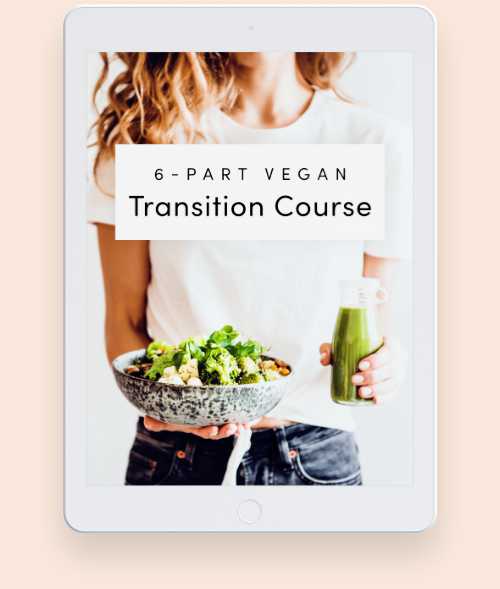
join our free vegan course!
Learn how to thrive on a plant-based diet with practical tips & a 3-day meal plan!
Within the vegan realm, eating a high-carb low-fat diet has been quite popular for a couple of years. Let’s see what’s behind this trend and try some delicious high-carb vegan recipes to see if you like this way of eating!
Don’t miss out on our in-depth whole food plant-based diet guide and read about the many reasons to go vegan here.
What’s the HCLF vegan diet?
A high-carb low-fat vegan diet is a subset of a plant-based diet that focuses on eating starchy high-carbohydrate foods like potatoes, rice or pasta.
Some proponents try to achieve a specific macronutrient ratio of 80% of calories from carbs, 10% of calories from protein and fat, respectively. This can only be achieved by eating very few high-fat and high-protein foods!
Oils and animal products are usually entirely avoided on an HCLF diet. Here’s a more thorough list!
Foods typically avoided
- Meat, fish & seafood
- Dairy & cheese
- Eggs
- Honey
- Vegetable oils
- Vegan butter
- High-fat coconut milk
- Vegan cheese or meats
- Donuts, candy, chips, etc.
High-carb vegan foods
Now that you know what not to eat on a high-carb low-fat vegan diet, here’s what to focus on when following this way of eating!
- Grains like oats, rice, pasta, millet, bread
- Root vegetables like potatoes, sweet potatoes, beets
- Fruit such as bananas, apples, mangoes, pineapple or dates
- Legumes such as black beans, chickpeas, lentils or peas
The last category, legumes, can contain higher-fat foods like peanuts or soy, both of which are only eaten in moderation on a low-fat vegan diet.
There are also less healthy, refined high-carb vegan foods like sugary cereal or fruit juices which should only make up a small amount of your daily food.
People on a high-carb low-fat vegan diet also eat colorful and leafy vegetables like broccoli, romaine, cucumber or bell peppers — these water-rich foods are healthy but not high in carbs, so we didn’t list them above.
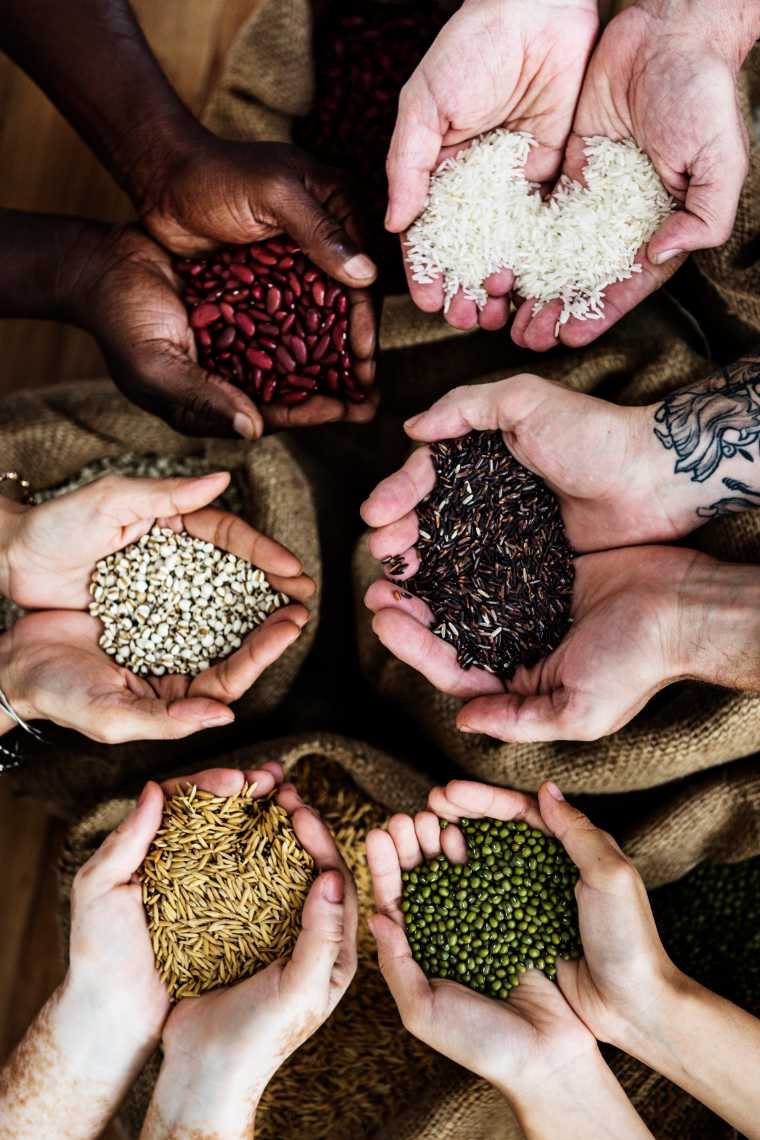
Aren’t carbs unhealthy?
No macronutrient is healthy or unhealthy per se. Individual foods can be more or less nutritious but every single food can be part of an overall healthy diet!
Carbs have been demonized for a while on social media, but mainly because they are equated with sugary foods or beverages. Only a few people go as far as to say that sweet potatoes or oats are unhealthy!
Choosing healthy whole foods over unhealthy foods is always more important than any macronutrient ratio.
What about fat & protein?
Fat and protein are essential in everyone’s diet — and every whole food contains carbs, protein and fats, just in varying proportions.
Protein consists of 20 amino acids, some of which we can synthesize ourselves, while 9 of them are “essential” — meaning we need to get them from our food.
An adult person needs around 0.8 grams of protein per kilogram of body weight each day. However, some RDs recommend slightly more than that for vegans!
Fats are made up of fatty acids, some of which are essential for us — meaning we need to get them from our food. Essential fatty acids include omega-3 and omega-6, both of which can be obtained on a vegan diet.
If you focus on omega-3-rich foods like chia seeds, flaxseeds or walnuts, you can meet your fatty acids requirements even on an overall low-fat diet!
When eating predominantly high-carb foods with some of the aforementioned healthy fats plus a good amount of beans and lentils (which are high in protein and carbs but low in fat), you can meet all of your nutritional requirements.
We’ll share with you below which foods to emphasize on a low-fat vegan diet to not fall short on anything!
Low-Protein Recipes →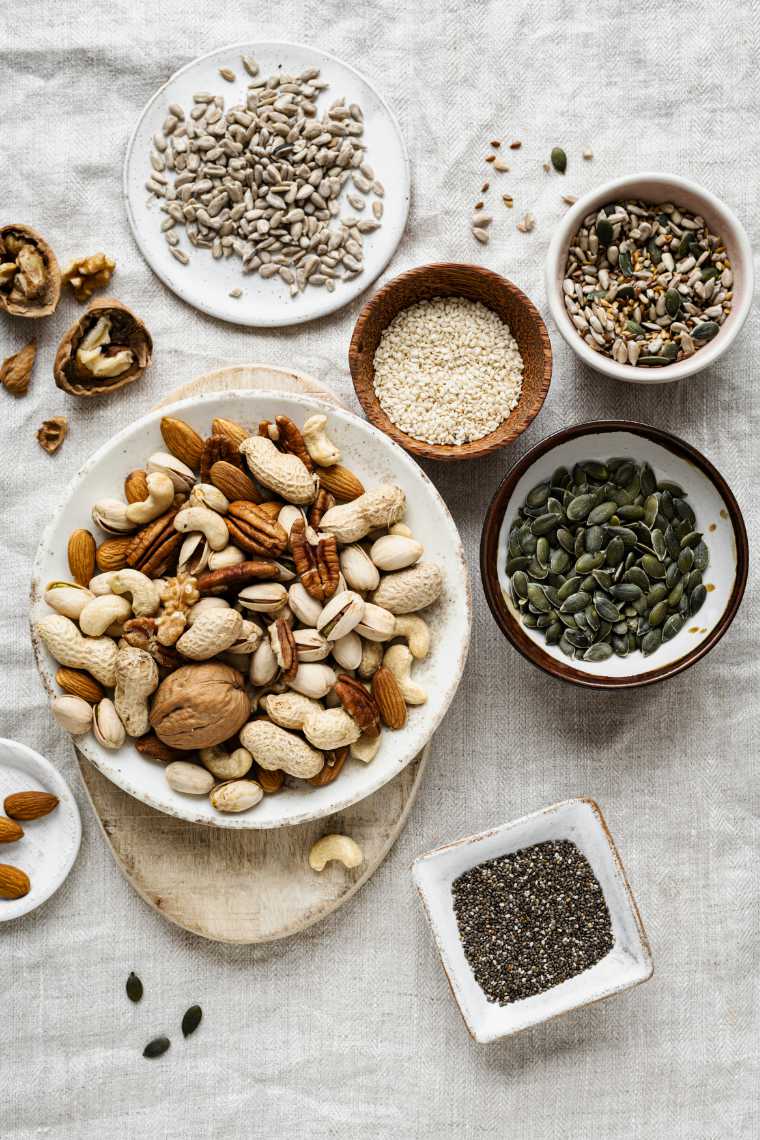
Typical high-carb meals
With so many delicious foods at your disposal, you can create a variety of tasty and satisfying meals! Here are some ideas:
- Smoothies
- Oatmeal
- Rice and bean bowl
- Sandwiches
- Pasta salad
- Banana ice cream
- Potato soup
Raw vegan diets
Some people choose to follow not only a high-carb vegan diet but a high-carb raw vegan diet — also referred to as a fruitarian diet because it mainly consists of fruit.
This eating pattern is highly restrictive and comes with many potential risks. There are no scientifically proven benefits of eating a raw vegan diet and it’s easy to fall short on protein, fat, B vitamins, calcium and more!
While it may be theoretically possible to create a nutritionally sound high-carb raw vegan diet, there is no reason to do so and it is not very sustainable for most people.
Many “ex-vegans” followed raw diets and then complained about the downsides of veganism instead of switching to a sensible plant-based diet.
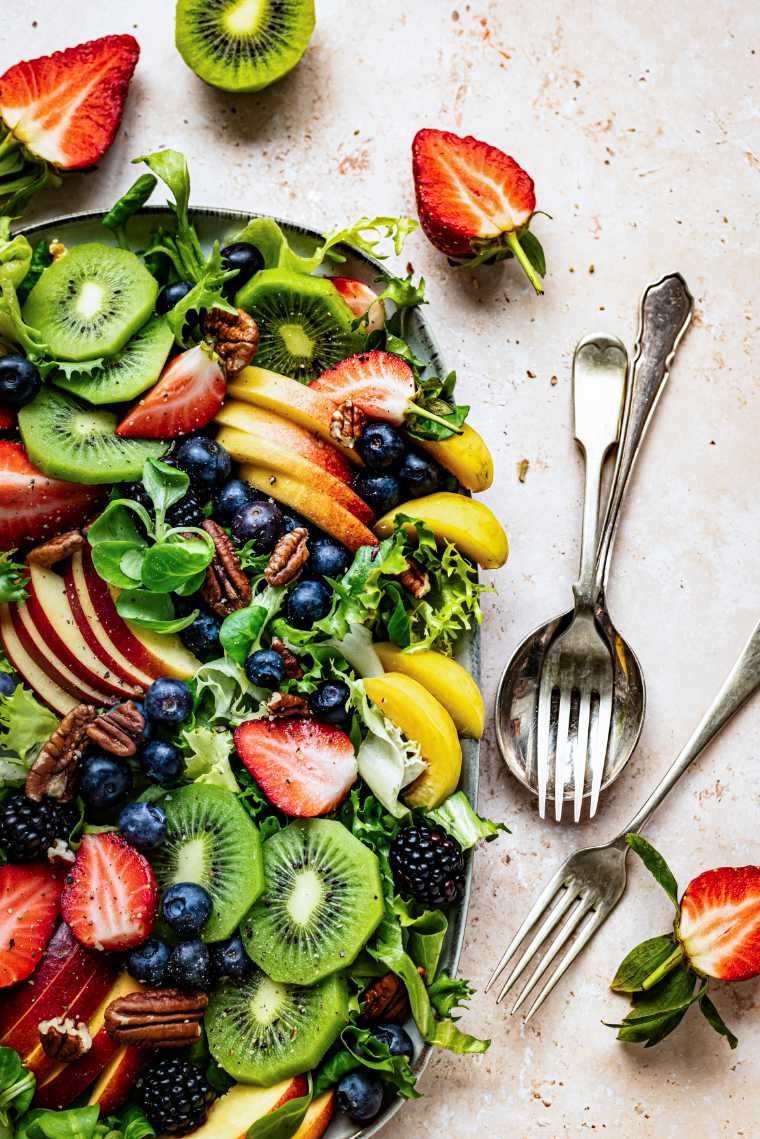
Vegan vs high-carb vegan
Being vegan doesn’t mean that you have to eat a low-fat diet at all!
The term vegan refers to an ethical lifestyle that seeks to exclude the exploitation of animals as much as practicable and possible.
This can totally done by eating vegan donuts, chocolate cake or French fries!
If you follow a high-carb low-fat vegan diet, you might be an ethical vegan; however, you also reduce the higher-fat foods like nuts, oils or avocado in your diet.
There are many ways to eat plant-based and you can make this lifestyle suit your needs! Here’s why you might want to consider a low-fat vegan diet.
Benefits of a low-fat vegan diet
A diet higher in carbohydrates with moderate amounts of protein and fat can work well for endurance athletes.
It may also help with:
- Type 2 diabetes
- Sustainable weight loss
Low-fat vegan foods are often very budget-friendly and staple foods worldwide, especially in poorer countries.
Please note that the main health benefits are achieved mainly by eating wholesome high-carb foods, not refined sugars! It’s also essential to eat enough vegetables with your starchy foods.
Weight loss on an HCLF diet
If you have an increased appetite and cannot shed excess weight, then a whole food high-carb vegan diet might be for you!
Due to the sheer amount of fiber and water in fruits, veggies and cooked grains, you will almost inevitably eat fewer calories than you used to.
This is because of calorie density, or calories per bite of food. Your stomach can only hold so much volume at a time and if you fill it with nutritious but bulky foods, you’ll have a much easier time losing weight!
Read our guides below for more.
Risks & drawbacks
Some health experts argue that following low-fat vegan diets is overly restrictive and that most people cannot expect better health results if they reduce oils, nuts and seeds in their diet.
Eating a moderate amount of healthy fats helps with nutrient absorption, satiety and offers a pleasant mouthfeel!
Some proponents of high-carb diets recommend eating no salt at all and much more calories than needed — anywhere from 3000 calories for an adult woman. Overconsumption of calories can do your body a disservice and lead to feeling sluggish, unwanted weight gain or indigestion.
Even when staying at a caloric balance, eating a low-fat vegan diet might result in large portion sizes due to the low calorie density of your meals. Therefore, it is possible to lose too much weight!
If you want to stay on a vegan diet long-term, it’s best to choose a way of eating that’s most joyful and the least restrictive to you. If that’s a high-carb diet, no problem!
Meeting nutrient requirements
Focus on these foods to meet potentially critical nutritional needs on a low-fat vegan diet!
- Calcium: oranges, green vegetables, calcium-fortified soy milk and tofu
- Iron: oats, spinach, dried figs, lentils, tahini, chickpeas
- Zinc: whole grains, chickpeas, lentils, tofu, pumpkin seeds, almonds
- Omega-3: chia, flax, walnuts, supplement
- Protein: beans, lentils, tofu, quinoa, oats, seitan
- Iodine: nori or dulse seaweed, iodized salt, supplement
- Vitamin D: sun exposure, some UV-light grown mushrooms, supplement
- B12: take a supplement
Easy HCLF vegan recipes
If you’re interested in trying low-fat vegan recipes, here are some of our favorites!
Conclusion
Low-fat vegan diets aren’t necessarily healthier than well-planned vegan diets that are higher in fat and protein.
While it can make sense for some individuals to keep their dietary fat intake lower, the research on low-fat vegan diets is still limited.
Most of the positive health outcomes associated with vegan diets, such as reduced heart disease and cancer risk, have been seen in plant-based eaters that didn’t restrict protein or fat intake.
Please don’t take dieting too far and seek out trusted sources instead of following any YouTuber’s advice.
Some alleged health experts exaggerate the benefits of eating fat-free or salt-free which is not in alignment with the scientific consensus and the position statements of renowned organizations like the Academy of Nutrition and Dietetics!
While we personally love many carb-heavy meals, adding some plant-based protein and fat makes them even more delicious and nutritious.
More vegan guides
Read these articles next for more information about plant-based diets and veganism!
Do you want to follow a low-fat vegan diet and was our article helpful to you? Let us know in the comments below, share this article on social media and Pin it here.

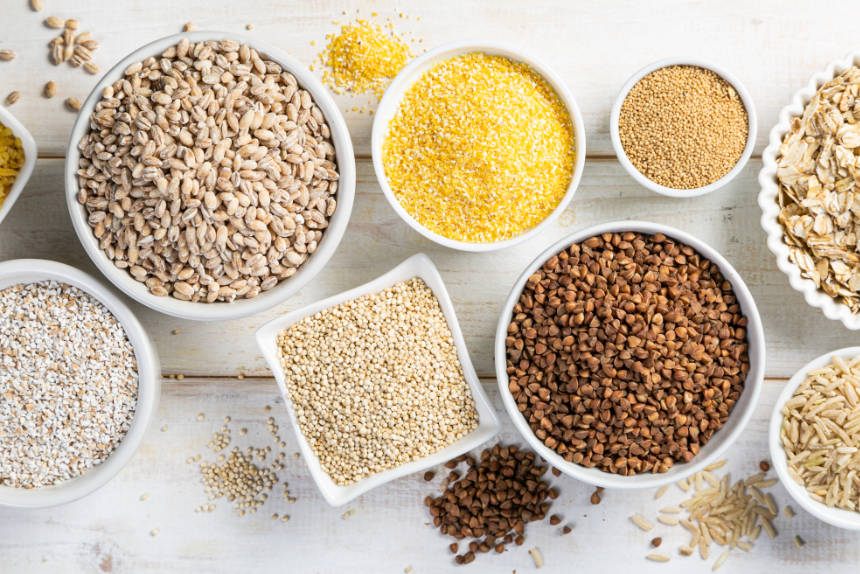
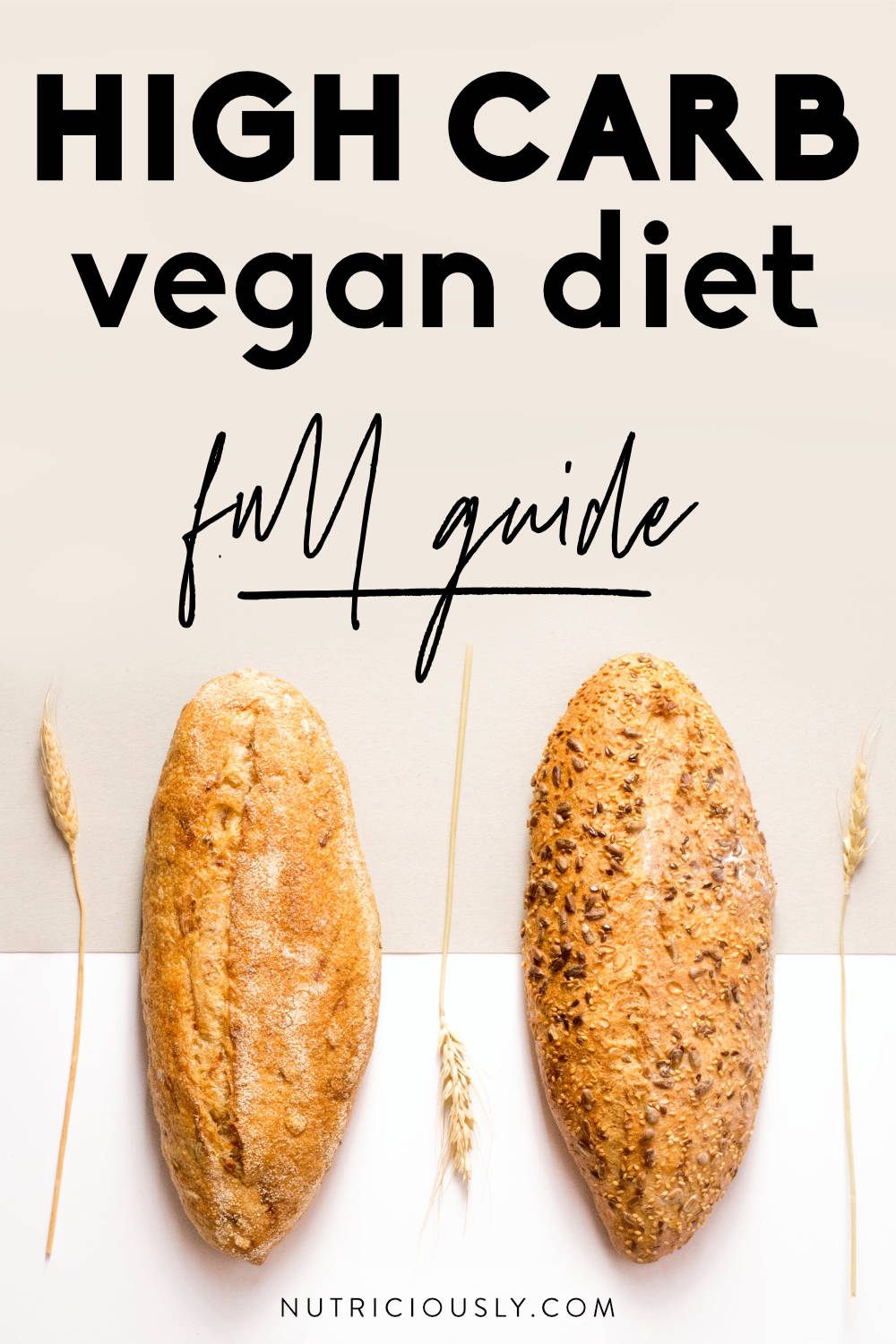
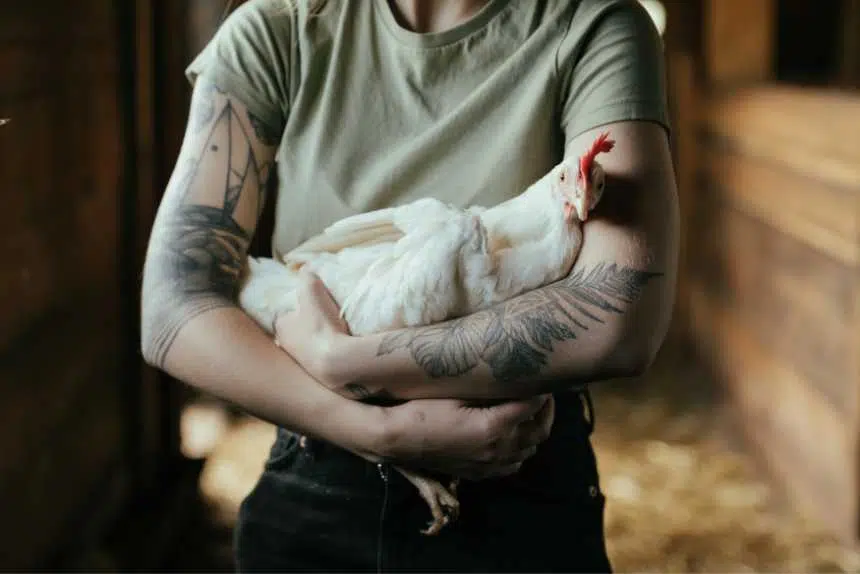
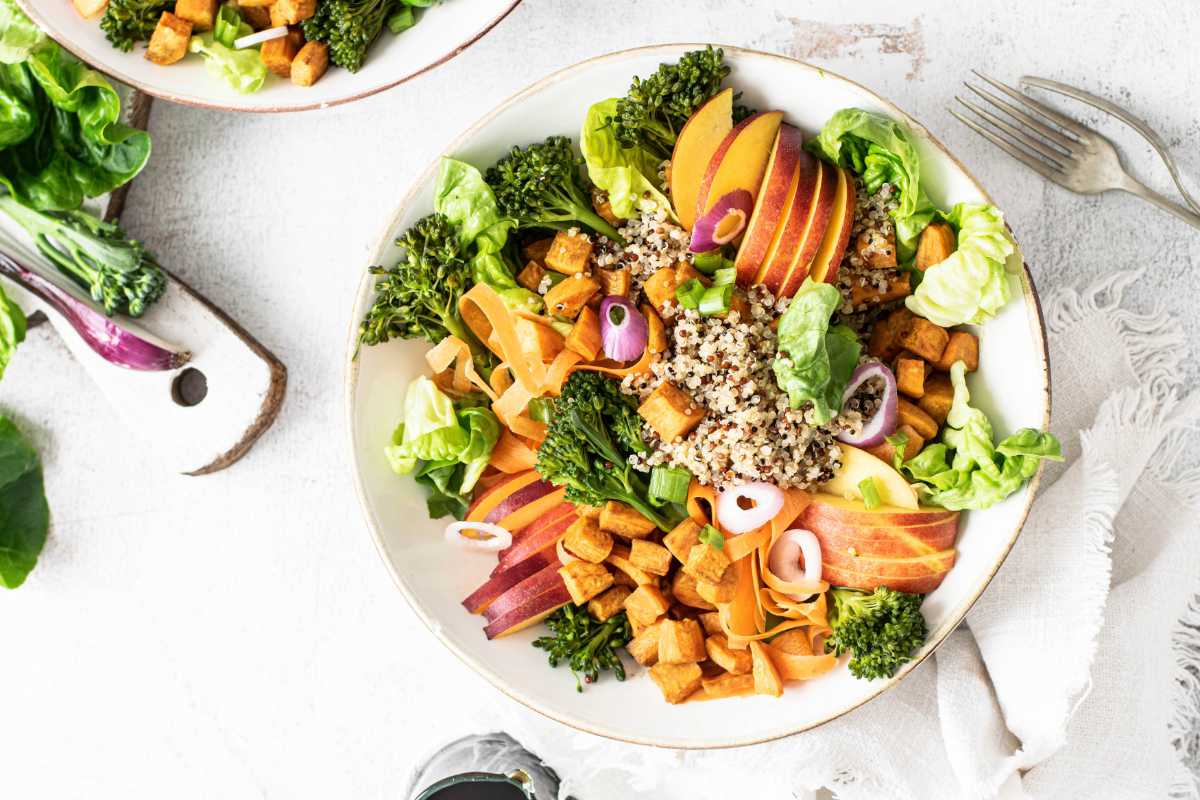
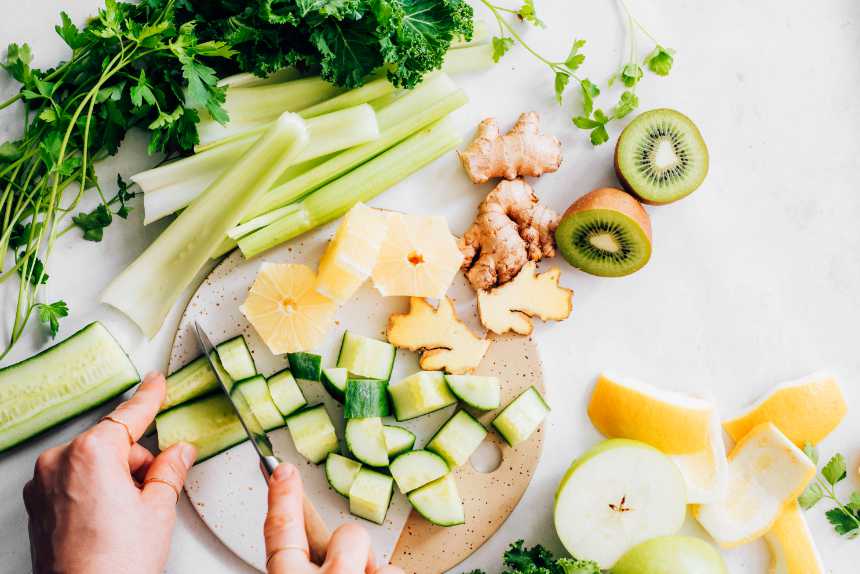
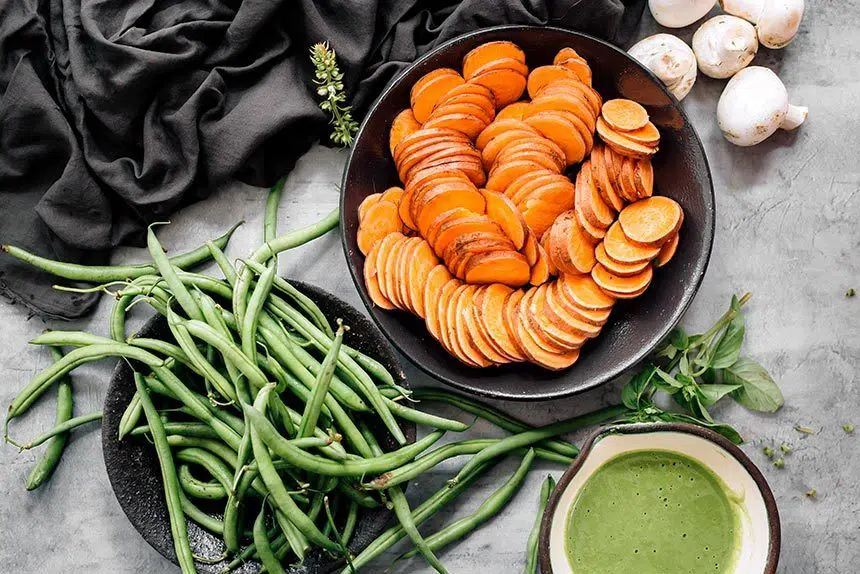
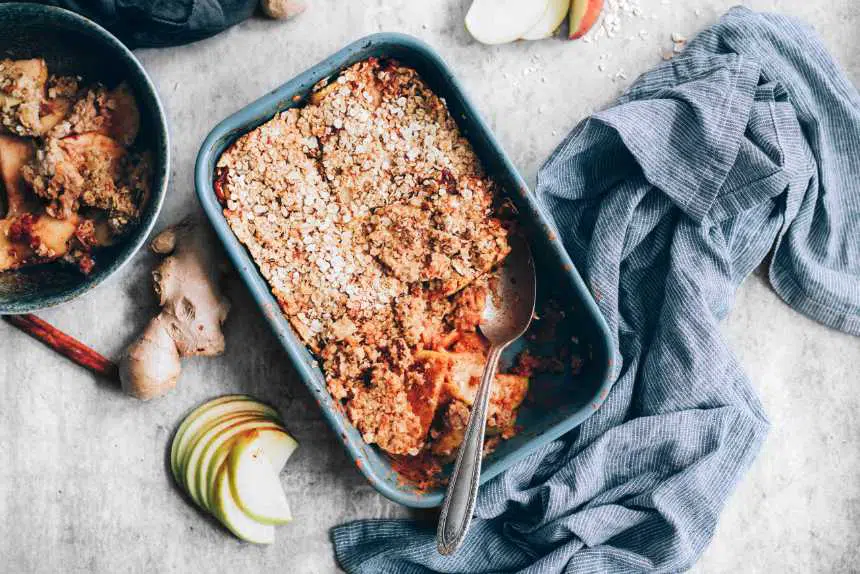
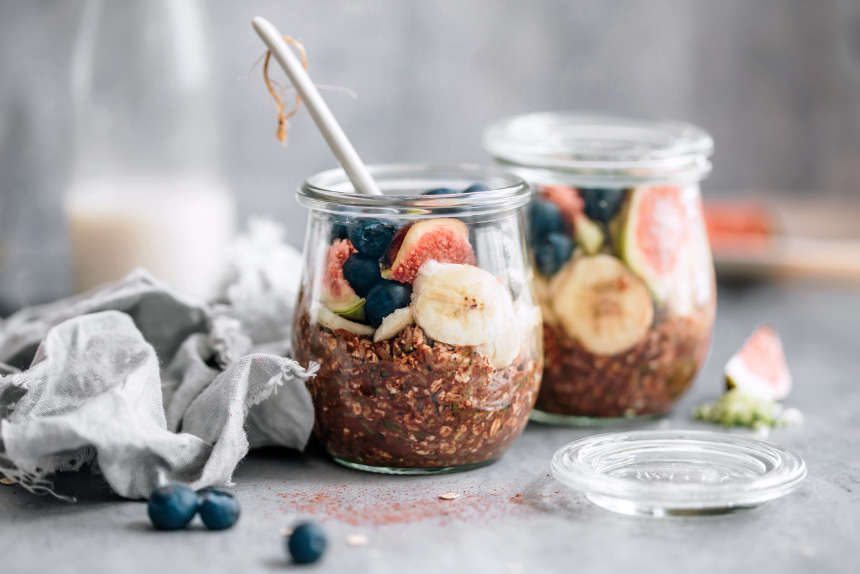
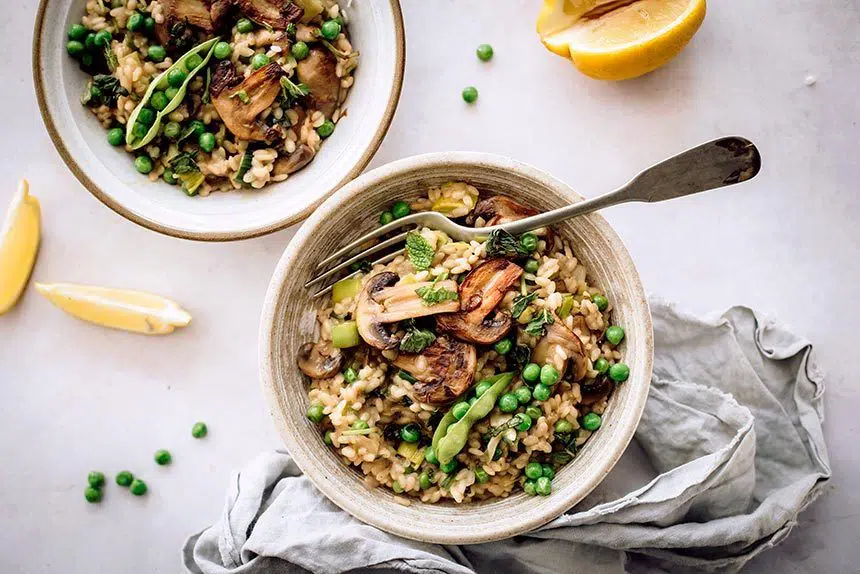
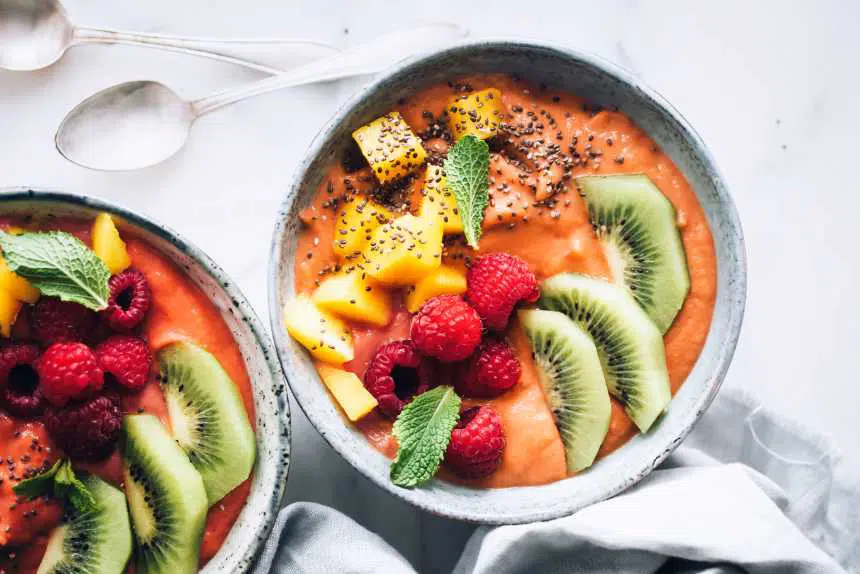
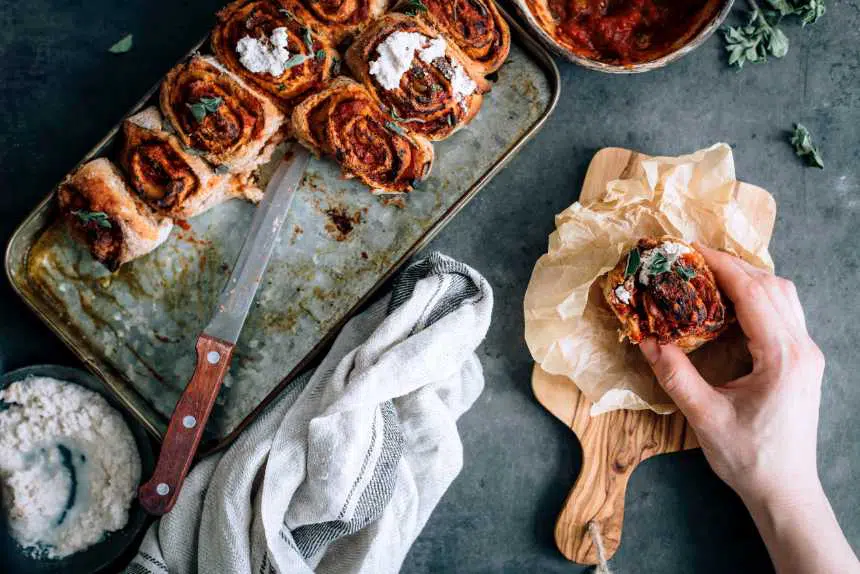
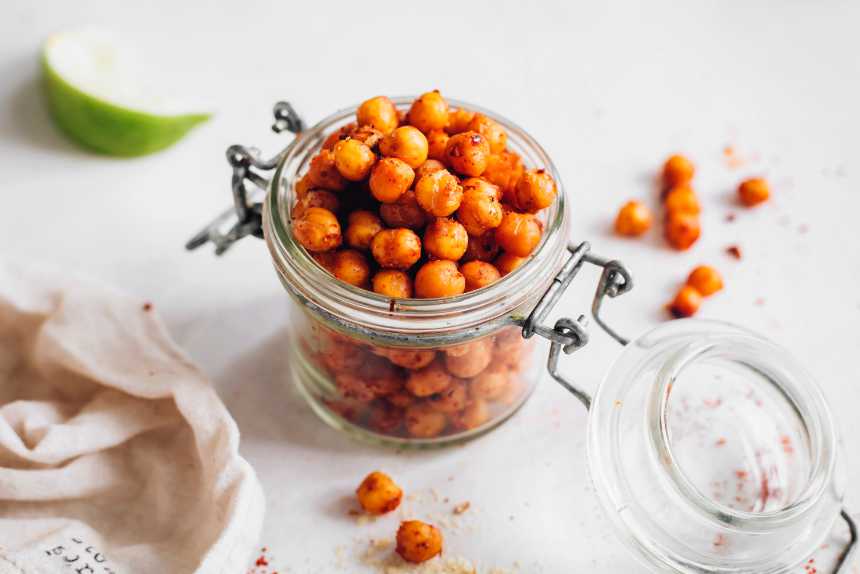
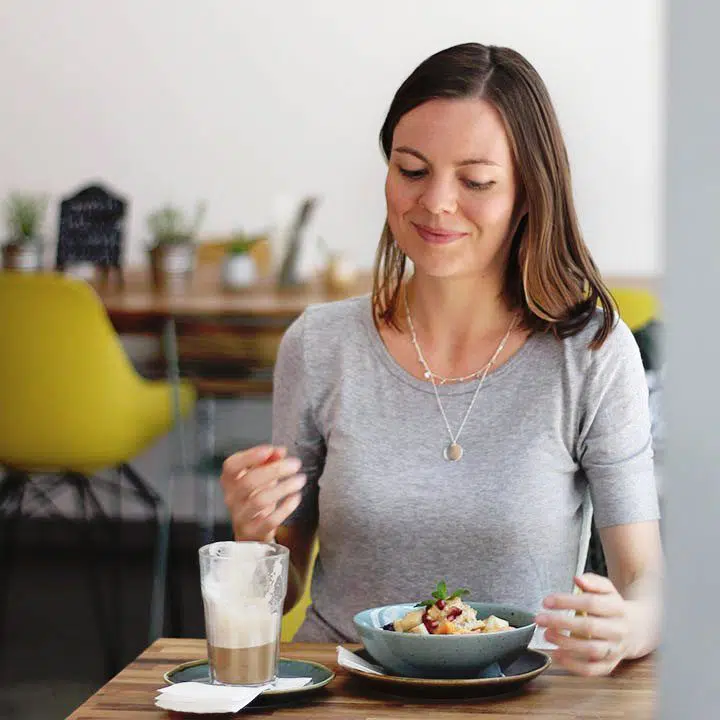
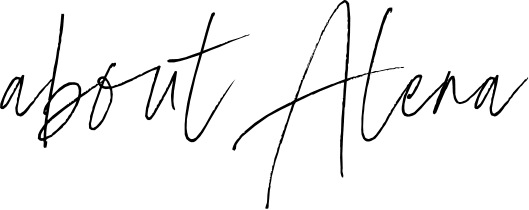 Alena Schowalter is a Certified Vegan Nutritionist who has been a vegetarian since childhood and vegan since 2012. Together with her husband, she founded nutriciously in 2015 and has been guiding thousands of people through different transition stages towards a healthy plant-based diet. She’s received training in the fields of nutrition, music therapy and social work. Alena enjoys discussions around vegan ethics, walks through nature and creating new recipes.
Alena Schowalter is a Certified Vegan Nutritionist who has been a vegetarian since childhood and vegan since 2012. Together with her husband, she founded nutriciously in 2015 and has been guiding thousands of people through different transition stages towards a healthy plant-based diet. She’s received training in the fields of nutrition, music therapy and social work. Alena enjoys discussions around vegan ethics, walks through nature and creating new recipes.
I’ve been researching veganism for awhile now and I’m almost there with adopting the lifestyle fully. Your emails and website has been an amazing resource thank you!!
That is until I read this article. I’m about to unfollow your website. I wholeheartedly disagree with your advice of a low fat diet. That’s really dangerous to the health of one’s brain. Vegan fats are the healthiest there is. Good dieticians recommend a profile of 30/40/30. 30% protein, 40% carb, 30% (healthy) fats.
I’m so disappointed in you for posting this rubbish advice in your article. I’m out of here!
Hi Shannon,
glad to know you like our work (for the most part).
I have researched your macro nutrient ratio and it only appeared on pages that were pro Atkins diet (a man who died overweight at an early age) or on pages that promote fad diets and cleary state that a lower carb diet (below 60%) isn’t sustainable and the weight loss comes from water weight primarily.
Dr. Neal Barnard, also say that too many fats (even from healthy sources), can interfere with insulin production in the body since fat blocks insulin from reaching the cells efficiently, possibly leading to diabetes.
Not using any oil is hopefully reasonable since it’s a highly processed food. It’s true that we don’t need as much as 30% protein – in fact, this much protein could be harmful to you, especially your kidneys. We did write that people should eat healthy fats in their whole form, like avocados, nuts, seeds, olives, or coconut… just not in huge amounts. You can regulate this yourself. In fact, every whole plant-based food contains all 3 macro nutrients, so you automatically eat some fat.
I know there’s so much contradicting advice – but I like to listen to physicians that are constantly researching the lastest peer-reviewed studies and the bulk of science does say that a low fat vegan diet is best for prevention of most chronic diseases.
I would like to know your sources though so I can get a better picture myself!
Wow! I really love how informant this article is. I’ve been a vegan since January 2016, and tried to do raw till 4 many times but like you said, with an active lifestyle it’s hard to eat so much fruit without going a bit crazy. My family all still eat animal products, and while they are supportive of my veganism, they think that its just a phase and that animal products are good for us! I plan to show them this article by you guys, because its so informative and you use primary sources and data to back up your claims. I just want to thank you again, have a great day :)
Hi Danika,
wow thanks so much for your amazing comment! I’m so happy to know that you found this article to be very helpful. We’ve been around the high carb scene for a couple of years already and wanted to finally share our experience as well as great sources on this topic. Please let us know if you struggle with anything on this lifestyle and just write us a quick email – we’re happy to offer any support we can.
All my best,
Alena
Hi
I have really enjoyed reading your site, and found it to be an all round article covering a variety of subjects.
I have been “dieting” for the last 2.5 – 3 years, in very unhealthy ways (which I can finally admit), and have managed to go from weighing 117kg (lbs) to 70kg (lbs) which is a total of 47kg (lbs) loss. Which sounds amazing and probably has helped my health alot. However as I said it has not be in a healthy manner.
So I am looking for a healthy way to loose another 10kg (lbs) and then maintain the weight loss. So I have been researching the LCHF and HCLF diets now for over a month and cannot decide which way I want to go. Everything you said makes sense. But then there are a lot of other people making sense too. So that leaves me confused.
Please can you read this following site: http://www.ncbi.nlm.nih.gov/pmc/articles/PMC2716748/
It has been a research experiment done by doctors and the results all show that a LCHF diet is the best way to go for my personality and I have found from past experience that I really do not crave any carbs when eating LCHF, but I am concerned about it long term. I am looking for something I can stick to for life. I am exhausted from all the periods of fasting for weeks on end and then eating less than a mouse. Then exercising for 2 hours with no food. Then eating again. I just want the truth. What should I do?
Hi Tamara,
thanks a lot for your comment. I totally understand your confusion since there are just so many ways to eat out there! So even though the diet that we (and most people who know a lot in regards to nutrition & science) suggest happens to be rather high in carbs, doesn’t mean that’s the only way to go. I don’t really think in terms of macronutrients anymore, but rather “what does this food have to offer”? So when it comes to fruits and veggies, they are amazing of course. So are nuts and beans. All of these foods contain carbs, protein, and fat. So what? They are whole foods, they contain fiber, water, and phytonutrients which makes them very healthy and helpful in regards to weight loss.
The reason why ketogenic diets can work is because they literally put the body in an ill state. You lose appetite, you lose weight, and you lose your health. More on this here: https://www.drmcdougall.com/health/education/health-science/featured-articles/articles/high-protein-diets/
What the science has really been showing over the past couple of years is that meat, eggs, and dairy make people overweight (because they are calorically very dense) and sick (causing heart disease, diabetes, and cancer). This is why you should definitely eat a plant-based diet primarily made up of whole foods. Here you can decide which ratio works best – you don’t have to go the high carb route. Instead, if you eat lots of veggies, beans and nuts/seeds, they you can keep the carbs as low as you want! If that works better for you, check out Dr. Fuhrman and his nutrition advice.
I have personally lost 10 kgs in a couple of months (while I was already in a healthy BMI range) and wrote a book about how I did it, what I ate etc. Here are 2 glimpses: http://nutriciously.com/eat-lot-still-lose-weight/
http://nutriciously.com/lose-weight/
Hope this helps! Please treat your body better and stop with the fasting. You need precious nutrients that keep you energized, healthy, and glowing. Please at least have some fruits and veggies when you’re trying to fast.
I’m going to write up a post on different vegan diets as well as dealing with overeating, so stay tuned for that.
And also let me know if you need any further support – you can always email us.
All my best,
Alena
The link that you provided is about High protein intake, which is a misconception towards HFLC.
It’s high fats, not proteins.
“The reason why ketogenic diets can work is because they literally put the body in an ill state”
Also, I think you mistook ketosis for ketoacidosis, two very different things.
Sorry it is 117kg (257lbs) and 70kg (154lbs) which is a loss of 47kg (103lbs).
Thank you
Tamara
Hi,
Great article! I want to become a vegan and I came across this when researching, you’ve helped me understand the lifestyle so much, thank you!
However I do have a question. Because I have been eating 1200 cals on a 50 carb, 30 fat and 20 protein diet (using my fitness pal) to try loose weight, it has worked very slowly, but I was just worried whether going to a 80/10/10 high carb vegan diet would make me put on weight? I have seen/read so many good things about veganism and how you can loose weight, your skin clears up really well and that you can just feel 100% healthier. I’m just scared I will pile on weight and my mental health would suffer as I have suffered from body dysmorphia for a long time. I would really appreciate any tips and advice.
Many thanks
Hi Paige,
thanks so much for your comment! I’m glad that you found this helpful so far. Your question has many layers but I’ll try to answer as much of it as I can.
Being vegan is about showing compassion towards other beings, it’s not just a diet that keeps you as thin as possible (though this is what can happen to you). We don’t like to think in any amounts of calories or macronutrient ratios – although whole plant-based foods have the lowest calorie density (calories per pound of food) and are usually high in carbs. I would really encourage you to forget about numbers because your body isn’t a machine and there’s more to your healthy and body shape than how many carbs or fat you eat. Although everyone has a different BMR (calculate that online), I could imagine that your diet of 1200 calories is too low in energy and that you may end up binging from time to time in order to make up for the loss.
I have personally lost over 20 pounds while eating as much whole plant-based food as I was hungry for – not trying to hit any number at all. But this wasn’t until I gained a couple of kilos from eating intuitively in order to make peace with foods I was afraid to eat. It only made me stronger and not any less worthy or beautiful.
So what I want to say: when you switch to eating lots of fruits, vegetables, beans and starches you can eat a lot more volume and nourish your body perfectly at the same time. Working on your body image and being so crazy/strict about your diet is another thing to work on and I’m not sure which one should be prioritized – because getting the “perfect thing body” won’t help your dysmorphia. This condition means you’ll never arrive at a peaceful end goal unfortunately.
Please email me for further discussions or advice! I was once in your place and really understand.
All my best!
Thanks a lot for this article, it has helped me to understand the HCLF vegan lifestyle better. I want to make a change regarding to my nutrition because I just wanna be healthier in general. I’m struggling with cravings for sweets and unhealthy food a lot and I was looking for a way to stop those cravings. That’s why I think I’m going to give it a shot to see if it works for me (hopefully). I’m only a bit confused/concerned regarding to muscle gain and weight lifting because of the small amount of protein (compared to the protein intake my trainer recommended). I’m a kickboxer so I don’t wanna lose muscle mass, but I wanna lose fat. Is the HCLF vegan lifestyle the right choice for me?
Thanks a lot and take care!
Hey Sammy,
thanks so much for the comment! It’s great that you want to try this diet and lifestyle to find out whether this approach works for you. Feel free to add in more plant-based protein if necessary like nuts, seeds, veggies, and of course legumes like beans, lentils, and tofu (no it doesn’t mess up your hormones!). As long as you don’t starve, you shouldn’t lose any mass. I’d love for you to check out some fellow YouTubers for more information and inspiration:
Plant Based Athlete
Ryan from Happy Healthy Vegan
Jon Venus
and this cool guy here ;) https://www.youtube.com/watch?v=R-dk07YLOko
Also, here is a great article by vegan bodybuilder Robert Cheeke: http://www.forksoverknives.com/how-to-build-muscle-on-a-plant-based-diet/
Hope this helps! We’re planning on putting out more content on plant-based diets and being athletic in the future.
All my best,
Alena
HI, I currentlyy struggle with anorexia, which I manage to overcome better on plant based whole food diet. I beacme almost excitd(mayb obsessive, but better that be starved) with healthy whole food and superfoods. I am stil researching, youtube vegan talks, What I eat a da vids, high crb, low carb, Fruhman, Mcdouhal, Elles Woodward deliciously…that is my beletrie now. However, I stil have a little fear to whooly eerge into vegan diet. Firstly, as I am undernoursihed, I think . maybe in eg yolk, youghurt is enough protein or calcium that is beter absorbed by my body. And secondly, of curse, I DO HAVE FEAR of lack of protein. But, what is my biggest concern is – can I reall”afford” to follow HCLF if I do need to weight gain? My internist(the mainstream, old one, who laght out when I say “vegan”saying its nonsense)says I can develop kwahishor – and something like cirhosise of kidneys(generelly, not from my blood test or so). He sas that this way eat africaines who has no acces to the enogh animal protein. So, that is also my concern. What amount of fat can afford to eat? I mean, there is a lot of girl who overcame severe anexia thaks to the vegan, high carb. Than, tehre is gloomin Ella woodward, whose book is packed with recies rich in oil, peanut butter and nuts. But maybe, avoiding oil, that is rather reasonable amount of fats? So, what sdo you thing, as anoectics, I really can decide and I reall need the advice from other side, I serach for examples, for these, who solved and fied the prbem thanks HCLF, or rather, thanks to vegan…I truly WANT to be vegan!thaks for resources…
Hi Katrin,
thanks a lot for your honesty. First, I want to stress that you shouldn’t be taking any risky steps without checking in with your medical team. I understand that being malnourished and underweight is dangerous – but so is eating animal products. The thing is that you don’t just have to recover physically, but also mentally. So I want to support your decision to eat a vegan diet but would like to emphasize that you eat a very wide variety of foods while you’re in recovery. The girls who said they recovered on a HCLF vegan diet came out saying that they just switched over to orthorexia (being obsessed with eating very healthy to the point of being stressed out any becoming deficient because they cut out too many foods).
So please don’t follow a lot of rules around your eating (I know that’s what your ED really really likes), but your freedom and health lie in letting go of restriction. Don’t limit your fat or protein or your carbs. If you can, choose healthy sources from whole foods, but challenge yourself to have some white bread and olive oil as well. Yes, those aren’t the healthiest foods, but you need to learn to be okay with eating them too. Plus if you need a huge amount of calories in order to restore your weight – then add in processed foods as well. You can eat a vegan diet and still follow your cravings for a burger or cookies or chocolate. Try to lose your fear for any and all foods.
It’s very good that you’ve been informing yourself so much around this topic and I’m sure it’s very helpful – but keep in mind that MDs like McDougall and Fuhrman usually work with people who have heart disease or other chronic diseases from eating TOO MUCH and they are most always overweight. So don’t use everything they say and implement it for yourself. Stay higher on the calorie density scale, blend up your fruits and vegetables in a smoothie so you can eat a larger volume.
I understand when people say you cannot/should not go vegan when you have an eating disorder because it could hinder true recovery, I’d love for you to be honest with yourself about that. For some of us (myself included) it was just hiding something and I had to “free” myself from this prison in my mind by eating some non-vegan food to find out that I actually have a choice. So I can choose to not eat that. A great resource for you could be the following 2 links:
https://www.youtube.com/watch?v=asBEjJ2n3TM
http://followtheintuition.com/
Please feel free to email me for more guidance and tips. I’m not a therapist or MD though I can tell you what it was like for me.
All my best,
Alena
Heyy Shannon, I just wanted to start off saying we share the same name lol. As for my question i have been vegan now for 1 year. I was following raw till 4 up until a month ago when i went to weigh myself for the first time in that year and found out i had gone up an extra 10lbs then i wanted to be at. I feel awful now with the way i feel in my clothes, i hate wearing things tight becuase i feel like im pregnant when im not. It’s fustrating and it effects my mood constantly at times even when i try to ignore it. Ever since finding out raw till 4 made me gain weight i came accross dr.mcdougall’s program to follow a starch based diet instead. So i have been doing that for a month as well as following the cronometer some adviced on their videos on youtube to check out. I want to lose 2lbs a week if possibly like it said i would if i restrict a certain amount of my calories i eat in a day and so far i have been following it religiously. I haven’t touched oil for the year, but even more so now i cut out vegan cheese and mayo from my diet too. I stopped eating nuts, seeds, and advocados from my diet. I eat mainly oatmeal for breakfast with fruit, no more coconut sugar, and lunches usually include a sweet potato and vegetables and supper too or i have rice and veggies. No oil, just spices like garlic powder. i can’t possibly think of any thing else i can do but i feel my weight still hasn’t made any signs of improvement and i’m just really fustrated and i feel awful because im constantly thinking about my size and how i look. Last time i was ever this size i went through an eating disorder when i was younger and now im at this size again that i haven’t been in a long time and i just want to get down to a healthy size i once was. I’m 5,3 and i weigh 159. I wanna get down to 120. But nothing i do works for me.
Hey Shannon,
thanks for your comment. Let me just reach out and give you a huge hug!! I totally understand you because your story sounds so familiar to me. I used to follow RT4 for a year as well and can now see why the recommendations really aren’t the best ones. Anytime someone tells you to not listen to your hunger or satiety levels, that should be a red flag. You will only lose weight and keep that weight off if it’s done in an enjoyable way, something you can do for the rest of your life… and that means no controlling your hunger or counting calories forever. Because once you hit the 120, you will need a strategy to maintain that weight!
Okay so the best way to do this honestly is to stick to whole plant foods. There’s this additional thing with calorie density that helps a lot and you’ve got that down pretty well already! Keep your meals 40% starch and 60% veggies, no oil, no nuts/seeds. You will get into a calorie deficit very easily that way… once I switched to this way of eating, I lost a few lbs in a few days, then hit a plateau. You just have to keep doing this for a few months! Nothing else will work better, I promise.
Also, please relax more… once I allowed my body to get rid of the fat whenever it can do that (not setting a time frame), then everything seemed to work even better! I know it sounds crazy but your hormones need a break as well. And please make it enjoyable, have a little ketchup on your potatoes if you want to or any other yummy condiments. I want you to feel like you’re not even on a diet on a day-to-day basis. Don’t make yourself suffer for every single day until you hit your goal! That’s precious time lost. Just keep emphasizing veggies, fruit, beans, and whole starches. Follow your hunger cues. It never doesn’t work :)
Let me know if you need further support! I always get back to any email personally.
All my best xx
thank you for this informative piece and it helps me who is trying to go vegan. But there are a few things that i am not sure about so hope you can help… i have been in a slightly restrictive diet for quite some time and lost a few kilos on it. according to bmi i am underweight but i think i am only skinny fat as i am still chubby in appearance. for the fact that i am only 5’1 and 44 kg and i am a 17 year old girl, i am really afraid that i will gain weight on a diet over 1400 calories (i only burn about 1400 calories everyday) so i don’t get how the magical weight loss thing happen in so many vegans like freelee and really afraid that i will become a fat vegan.. please reply and thank you so much!!
Hey Annie,
thanks for your comment. We don’t recommend calorie restriction but rather emphasize eating foods that are rather low in calorie density. This is why you can eat a larger amount of whole plant foods than let’s say meat, oil, or other junk food. There are no magical calories that are just not going to make you gain weight – although not every calorie is the same in regards to the whole package it comes with.
Freelee lost her weight while eating a raw vegan diet, not while stuffing herself with 3,000+ calories per day. She is now fairly active and therefore can eat more than the average woman. Her weight loss was very slow too which means she didn’t create a huge deficit.
If you are “skinny fat”, then you don’t need to eat less but to move more. And in order to have enough energy to build muscle, you also need to eat more! Try to find a balance of lifting some weights and also increasing your calories a little. Let me know if you need further support, you can always email us!
All my best,
Alena
Hi Alena, have you heard of Dietary Thermogenesis? It’s supposed to explain how we can’t put on weight eating high carb diet.
Hey Joe,
yes I’ve heard of that. At some point, though, if you really overeat on calories, even carbs will turn into fat. It’s not as efficient, but it happens. Also, the naturally occurring fats in whole foods (like grains, fruits, veggies) will accumulate and be stored as body fat. So it’s not a pass for eating a crazy amount of calories – it’s not healthy or pleasant, either. Hope this helps!
THANK YOU! I’ve gained quite a bit of weight, at least 30 lbs. Probably more. I’m 5’8 1/2 and what is most surprising is people’s judgmental behavior toward this lifestyle. So many people are “concerned” about the weight gain and I try to explain the metabolic damage but they just have this shocked look on their face. Reading this has inspired me to keep going and motivated me to keep sticking to it and not to give up because the haters will hate! Thank you again for sharing this!!!!!
Hey Jack,
thanks for sharing. We don’t recommend people eat a certain minimum amount of food/calories… meaning you should just listen to your hunger and eat whole plant foods. This most likely means you’ll eat a high carb diet! Please take really good care of yourself and don’t forget to eat plenty of veggies :)
All my best,
Alena
Alena,
Great article! This was well written, clear, and accurate. I’ve been vegan for 2 years now and I still love reading plant-based diet blogs because I’m happy to see other people live and share the truth about nutrition! Thank you for being one of those shining stars.
My husband has been vegan for almost a year now, but he hasn’t done his own research because he relies on me to teach him everything. Lately I’ve been printing off articles from the internet for him to read so he can build his own foundation of knowledge. I just printed your blog post to share with him because it’s simple and comprehensive.
Again, thank you so much! This is very well done.
Andrea,
thank you SO MUCH for this glorious comment! Really made my day :) I’m very happy to know that the article resonated so much with you and hope that the hubby will get something out of it as well. Let me know if you ever need further support – we get back to every single email.
All my best,
Alena
Hi Alena –
I would love to get your advice. I am stuck in a situation where I cannot gain weight no matter what I do – very thin, thinning hair and have bad acne. Deficient in a lot of minerals/vitamins even though I eat a ton of fruit. I am obviously dealing with some serious health issues, but no diagnosis has ever been made. I was told by several doctors to go Paleo to heal… however this has not helped. I am now trying to go HCLF Vegan, but I am very confused as to if it is ok to eat fruit after eating cooked foods. With the uncertainty I have been trying to follow Raw Till 4 just to cover my bases, but I find myself getting shaky around 2pm. I have a large smoothie for breakfast that keeps me full for a few hours… then I typically have 4 clementines for a snack and then shortly after that, I can’t seem to sustain it… I get super hungry and then devour anything with flour!! I am trying to avoid any gluten – do you recommend oat? Maybe I need to figure out some good lunch options. I am trying to heal my liver and clear my skin. Is a HCLF safe for someone who really needs to gain weight?? Thank you!! Kim
Hi Kim,
thanks so much for your comment and sharing your story! I get that it can be very frustrating to deal with all of this.
We are not proponents of a high fruit diet or Raw Till 4. There are many reasons as to why this way of eating isn’t the best one out there. Fruit doesn’t satiate you the way starches or legumes do. That’s why you get shaky and ravenous on this diet. Happened to many people! No real doctor would ever recommend this way of eating. We need complex carbs this is why we emphasize eating starched like potatoes, sweet potatoes, squashes, oats, rice etc. All of these are gluten-free too – but no need to cut out gluten unless you’re celiac or allergic. Do it if you like but gluten containing grains have their health benefits as well.
For a lot of people, eating tons of simple sugar and fruit makes their skin even worse and it leads to breakouts. Especially the thinning hair is a warning sign that you need to get more minerals instead of just fruit. So make sure you eat a good amount of veggies, legumes, and grains! If you want to gain weight, eat flour products like pasta or bread because you can get more calories that way. Try no overt fats like nuts, seeds, avocado, oil etc to see if your acne gets better! These girls basically eat the way we recommend (low fat vegan) and see which results they got: https://www.youtube.com/watch?v=5Qdwn2itsgg
They are both pretty thin too, but they don’t lose any additional weight.
Please check back with your health professionals on that and check out Mr & Mrs Vegan who have a ton of great info on that – especially on their tumblr. You can just search for anything on there. You can also check out PlantBasedDoctors.org
Hope you’ll get better soon! Feel free to email us for more support.
All my best x
Hi – I have the same problems. I have had some kind of mystery illness for a year and a half, and I used to eat a diet with organic meat. I switched to vegan this fall, and I have lost about 3/4 of my hair. My hormones (which have always been off, as I didn’t get a period even when I ate meat), are so so low. I am a normal bmi for my height, but on the thinner end of the spectrum. I used to be underweight and overexercise, but I have not restricted calories. I am a whole foods vegan and I eat healthy and SO much, and I don’t know what to do to balance my hormones to make all of this stop. Have you found a solution? I don’t want to go back to eating meat, but I don’t know how to sort out any deficiencies or hormones. I was eating beans, “healthy” fats like coconut oil, nuts/seeds/avocado/coconut, fruits and veggies. Now, I am working with a health coach who wants me on a high raw vegan diet eating mostly fruits and potatoes for calories with no grains, legumes, or fats. I am stuck between going back to eating meat or doing a HCLF vegan diet without grains and beans…My current “balanced” way of eating did not work. Help!
Hey Jackie,
so sorry to hear about your struggles! Please do work with a team of health professionals on this, people on the internet generally aren’t qualified to deal with these issues. You can consult a plant-based doctor using this website: http://plantbaseddocs.com/ Many of them work over Skype as well. Not sure if cutting out legumes and fats will be helpful in your situation but I could be wrong. Again, I am so sorry you are in such a situation! I’m very sure that it isn’t caused by a meat or dairy deficiency, though. There are no magical nutrients found in animal products, they come in whole packages along with saturated fat and cholesterol, both of which you don’t want. I wished I could help you more. But honestly, not every issue is fixed or caused by nutrition! Sometimes you need to take some medication in order to get back on track if it doesn’t have anything to do with your food.
Take care! Best wishes x
Hi there, I just wanted to commend you on taking on an important topic within the vegan community! I also wanted to point out that when taking on such large and important subjects it’s important to cite your facts with sources. When you discuss the different approaches to veganism, as well as discussing protein, exercise, hydration, and sleep, it will strengthen your article by using studies and clinically backed articles to back up your claims. As we all know, just because something is written on the internet doesn’t make it true. You have a lot of valid points and they merit citations. An article that takes on such a large topic would benefit by mentioning renowned experts like John McDougall, Dr Barnard Dr, Furhman, Dr, Esselstyn, and Dr. Campbell. Also, putting a name to other individuals who have been a big part of the vegan movement online is important. For example, the quotation “the proof is in the [banana] pudding” has been a very popular saying by Freelee the Banana girl, and she should be recognized for it.
Additionally you need to be very careful to avoid using overgeneralized statements such as “back when everyone on YouTube either ate vegan junk food or a fully raw diet” and “while those who stuck with it got great results in the beginning, 99% of the former high carb vegan followers have resumed to eating (at least some) cooked food again.” –these are not facts, but your perception and should be stated as so. Failing to make that distinction can make your writing appear incredulous and potentially offensive.
Good luck spreading the message and I really hope you consider using citations to strengthened your facts and research as well as clearly separating your opinions from what you state as facts or information, as they will help your writing be more credible and, hopefully, reach a broader audience.
Sandy
Hi Sandy,
thanks so much for your valuable feedback! I wrote this article a while ago and am really surprised that I didn’t talk about specific people that are important in the high carb vegan movement. Did I really leave out all of the doctors? Just wow. I used many sources to back up my claims, though. What do you think I missed? Sometimes I used more than one information from a particular source and I didn’t link every single sentence back to it. I see what I can do about citations, it’s just not usually our style.
I will give this article an overhaul next month!
Hope this finds you well and thanks again for the comment :)
Warmly,
Alena
Great Article! I love plants!!!! I tried going vegan but unfortunately after several attempts over the years my body wouldn’t adjust. I can’t have soy, wheat, legumes for inflammatory and estrogen health reasons. I needed more B12, creatine, carsonine and refuse to do supplements. So far I’m doing 90% local seasonal vegan – no processed foods and feel great! I don’t eat mammals and am only drinking local water… if I can’t do it 100% I can do my best. Keep inspiring people ;) love your well written posts! Keeps me motivated. I gave up acai bowls and bananas as they are not local (I’m eating nothing imported) do you have suggestions for alternatives to curb the cravings!? Thx!!!!
Hi Manda,
I’m glad that you like the article! Have you tried working with a dietitian on following a vegan diet in your situation? Maybe there are a few options for you. Here is some information on anti-inflammatory foods: https://www.drmcdougall.com/health/education/health-science/featured-articles/articles/diet-only-hope-for-arthritis/
Please be aware that animal products aren’t a reliable source of Vitamin B12 since it’s produced by bacteria. Roughly 40% of the population here is deficient in this nutrient and almost all of them consume animal products. Supplements aren’t a bad thing and surely safer than eating animal products which can cause heart disease, diabetes, cancer, and more. The other 2 nutrients you mentioned aren’t essential, your body produces them usually. But I don’t know about your situation and urge you to work with a health professional on this.
I’m happy to know that you can do a 90% vegan diet! We don’t stress eating locally and seasonally because by just eating plants, we’re already doing so much.
Since I don’t know where you live, I have no idea which types of fruit are local for you. I guess dried fruit isn’t an option? Check our priorities and if you don’t find anything else that curbs your cravings, consider reaching out for your favorites anyways. Sorry if that wasn’t too helpful now.
All my best,
Alena
Hey Alena!
Since you seem to be in charge of replying to the comments I thought I’d ask you a few things.I have Type 1 Diabetes and I was diagnosed when I was 10(that was 9 years ago) and I wasn’t suffering from obesity,my family’s medical history involved diabetes and so when I was 10 it appeared and I’ve been living with it for the past 9 years.I’ve been vegan for a few months now and I’d like to know if I can pull off the low fat high carb vegan lifestyle in my current situation.I had issues maintaining my weight go back and forth but my weight has been somewhat stable and under the standard my doctors told me I should be in but I’m having trouble with getting rid of the excess fat for years now.Any ideas?
Thank you
Lewis
Hi Lewis,
thanks so much for your comment, I’m thrilled that you’re interested in eating a healthy vegan diet. Please note that I’m not a medical professional and I don’t feel comfortable giving you clear advice here. I would love to send you over to Robby, another type 1 diabetic who is eating a high carb diet: http://mindfuldiabetic.com/
Also, please see the follow information:
https://www.youtube.com/watch?v=k0UY4Q_m6E0
https://www.forksoverknives.com/type-1-diabetes-vegan-diet/
http://www.pcrm.org/health/health-topics/diet-and-diabetes-recipes-for-success
Wishing you all the best,
Alena
My diet without any prior knowledge or decisions! It’s what I like to eat naturally. I rarely eat meat and never eat processed food. A lot of cereals, especially wheat and barley. No dairy except for cheese occasionally. Vegetables, fresh and dried fruits always present. Almonds & dries dates are a dessert. I hope to perfect my diet through reading such informative articles as yours. Thanks for encouraging, Alena.
Hi Saad,
thanks so much for your comment! It’s amazing that you intuitively eat that way :) Most people consume lots of unhealthy food and have to learn about this way of eating before they arrive where you are.
I’m glad you found my article informative, feel free to check out the rest of our work and let me know if you have any questions.
Warmly,
Alena
I went on a really strict diet and lost 25 lbs then gained it back slowly, after I gained it back ive been really motivated to lose the weight a healthy way so I decided to try veganism and work out , I’ve done it for 2 weeks but my weight has stayed the same… Is that normal?
Hi Ali,
thanks for your comment. You are the perfect example as to why strict diets don’t work: as soon as you go off of it and shift back to your old way of eating, the pounds come back as well. It was the exact diet that made you gain weight in the first place! This is why we always recommend creating new healthy habits that will enable you to stay slim for good.
Now, let’s talk about veganism and weight loss. It’s much easier to lose weight eating only plants – if you don’t stuff yourself and eat them in their whole form. We usually recommend your meals contain at least 50% veggies if you’d like to lose weight. Stick to whole grains, brown rice, oats, potatoes etc. for the other half of your meal. Eating lots of fruit isn’t perfect for weight loss because you can easily eat 800 calories and don’t feel satiated for very long. Here’s a good overview: http://nutriciously.com/eat-lot-still-lose-weight/
And here’s a free ebook on this topic: http://nutriciously.com/lose-weight/
Feel free to email us if you have any further questions!
All my best,
Alena
How do you calculate the 10% protein?? ty
It’s best to track your food over a few days using a free online tool like cronometer.com
You will find the percentages of macronutrients on there. The 10% protein means 10% of your overall calories should come from protein which is fairly easy on a vegan diet. You can eat more than that if you like, it’s not harmful when the source are whole plant foods like beans, lentils, whole grains etc.
10% of the complete protein??
ty
Yes, so when you eat 2000 calories per day, 200 should come from protein. Protein has 4 calories per gram, meaning you need around 50 grams per day :)
Hope this helps! Hop over to cronometer.com and track your food so you know what you’ll be getting. The macro ratio matters less than the source, though. Keep your food whole and plant-based for best results.
how to get a complete protein? ty
No need to do anything special. Read more here: http://nutriciously.com/plant-based-protein/
Wow, this has so much useful information. I’ve been eating a vegan lifestyle since April 19, 2016, so it’s been almost a year. I’m not going to lie, but honestly, I haven’t lost any weight on the way I was eating, but I defiantly think that the reason for this was because I was eating so much junk food.I was eating so many chips, fast food and I wasn’t exercising enough. I feel guilty for eating the way that I was eating, but I think I’m ready to make a change. I didn’t know what the HCLF vegan diet was until now. I’m praying this works and I start to feel better!
Hey Annie,
thanks so much for checking in! I totally get your frustration – I didn’t lose any weight back in the beginning when I went vegan 5 years ago. The term “vegan” only describes that you don’t eat any meat, dairy, eggs, or honey – but like you said, it can very well include chocolate, chips, burgers, beer, and soda. We like to call it a “whole foods plant-based/vegan” diet because it makes it clear what’s on the plate.
Here’s some information on easy weight loss as a vegan:
http://nutriciously.com/eat-lot-still-lose-weight/
http://nutriciously.com/lose-weight/
Let us know if you need any further support.
Best wishes,
Alena
Its been a month that I loss weight because of this article. I really love to eat a lot but this time I am very strict with my diet. And I would like to commend this article. And now I eat dried fruits and some nuts on my cereal every morning and organic food on my lunch and dinner… Thanks so much.
Awesome, we’re so happy that you’ve been getting great results! Make sure you eat enough to make this stick and view it as a lifestyle. We like dried fruit & nuts as treats, too :)
I respect your ethical stance on diet, but I’m afraid your politics seem to be clouding out the science. I see no reason that a ketogenic diet can’t be maintained while still maintaining strict veganism, so I don’t understand the aversion to it. A ketogenic diet is not a “high protein” diet, nor is it Atkins. We were evolved to be ketogenic for millions of years before we developed vegetable farming relatively recently. The only difference is that now we need to work around the ethical dilemma of traditionally relying on animal fat and animal protein to live healthy.
I have lived “Ill” on ketones for quite a while now, and I can assure you, my doctor is extremely happy about it. You are misreading the common initial electrolyte imbalance as a permanent condition. You are also suggesting we can eat all the protein we like. To the contrary, we minimize protein so as only to prevent lean tissue loss. Based on the references you have provided, both you and they seem to confuse Atkins and HFLC, which tells me you don’t know the difference, and therefore don’t really know too much about it.
I suspect that the desire to convince people to follow a vegan lifestyle has prompted you and the others you read to demonize fat and protein, even plant-based fat and protein. I wouldn’t throw keto under the bus simply because many people doing keto use meat to do so. Meat and dairy is optional.
I wish you well. I feel you would attract more attention to your honorable goals if bias wasn’t a part of the pitch.
Hi Ed,
could you please point us to peer-reviewed, solid studies that demonstrate the benefits of a vegan ketogenic diet? I think there’s no need to discuss the detrimental health effects of meat, fish, dairy, eggs, or oil. Here’s our stance on why low carb and especially ketogenic diets are very unhealthy: https://www.youtube.com/watch?v=MzHLAqyO7PQ&t=632s
We basically follow what the majority of the science says. Veganism is an ethical standpoint but one could probably create a very low carb as a vegan, too. There are just too many reasons not to.
Have a nice weekend!
you ask him to point you to peer-reviewed solid studies and proceed to support your opinion with a youtube video?
I also saw you mention that Dr Atkins was overweight at his death and he died at a young age, yes 72 isn’t exactly old when you are trying to ‘sell’ a health system ( diet ) but if you read the reason he died it had nothing to do with his lifestyle.
Atkins died because of an accident, I believe. His records reveal a history of cardiac arrests and being overweight in unhealthy in and of itself.
The video I posted cites many studies and is just overall put together pretty well.
Hey, a great article. I just wanted to briefly point out that saying “There’s vegan burgers dripping of oil, vegan cheese made with 20 different artificial substances, vegan muffins with a ton of refined ingredients, and of course soda.” is kind of a bad phrasing. Saying 20 different artificial substances is like saying vegans make their food out of globs of chemical goo and there is a scientist holding your burger as it drips with acid or something, not a good image! It is also in most cases pretty false. For instance this cheese recipe-> https://minimalistbaker.com/garlic-herb-vegan-cheese/ is completely “natural”. It tastes great in lots of places, and it gets misrepresented when articles like this say its artificial. Now, I realize you meant it as if to buy from a store, so therefore it has to be a lot more, shelf stable, appealling to average (generally not even vegetarians) consumers, which therefore means the ingredients list looks like a horror show of preservatives and all sorts of things. But this point is moot if more people realized they can make the same great tasting products, and more importantly healthier, and at a better price. So, not saying your so much wrong, as, you could be more correct if you had used a different phrasing.
Hope that makes sense!
Hi Tim,
I totally understand what you mean and would phrase it differently if I were to write that article today. As you might have seen, it’s already over a year old and things can change :)
Thanks so much for your honest feedback, I plan on overhauling it soon. No shaming the great recipes with more ingredients! And the word “natural” doesn’t mean much anymore, we don’t want to create a fallacy here.
Hope this finds you well,
Alena
Hi, I was wondering do you have an opinion on diets for when working out, that wont make me lose too much weight. I was thinking of starting a working out to try and get my mottom bigger, something like this one looks cool, http://bestbootyworkouts.com/tammy-hembrow-workout/ would this be safe to do if I’m on a diet? Or would I be better off doing your program instead? Im’s worried I will lose more of my booty if I do your workout.
Hi Ying,
in order to build muscle and not lose weight while working out, you need to eat more calories. When sticking to a HCLF vegan diet, go for bread, pasta, cereal, tofu, beans, and some nut butter.
I cannot tell you which workout program would be best for you – start where you’re at, challenge yourself but don’t overdo it and choose something that’s fun. You should think of it as a lifestyle change, some kind of exercise you can see yourself doing for years on end.
Hope this helps! Article on vegan muscle coming very soon.
Best,
Alena
I have been vegetarian since 7 years old, later when I was 30 my blood test showed high cholesterol. I started a HCLF diet, my cholesterol got down, but it was there. Then, improved the carbohydrates eating only whole carbohydrates, however I had less cholesterol. I practiced yoga asana, but my cholesterol problem was there. My doctor found my metabolism was very low. Then, he recommended a strong aerobic exercise. Now, I have a HCFL , I practice Yoga, and I jog every other day, and my blood test does not show cholesterol.
Wow, what a journey! Glad you have found what works for you, Humberto. Some people have a naturally higher cholesterol number which isn’t too dangerous, though, if you’re eating whole plant-based foods. Keep working with your doctor on this and feel free to check out some plant-based experts (McDougall, Greger, Esselstyn, Barnard etc.) to see what they are saying.
Have a great weekend!
– Alena
Hi.
Great article to read. Thank you.
I’m a bit confused about the no oil (including olive, canola, or coconut) part.
What should I use then to cook with?
P.S.:
I’m just a vegetarian (halfway to Vegan lifestyle already)
Hi Peter,
thanks for the feedback! We sautée our veggies in water, lemon juice, soy sauce, or vegetable broth. There are a lot of reasons for skipping oil which we will explain in an upcoming article. When baking, you can use prune puree, applesauce, mashed banana and more instead of the oil.
Let me know if you have any other questions & feel free to join our free e-course!
Best wishes
Alena
Great article !
I have heard heard that intermittent fasting is good for your health . Also, no matter any diet involved, to reduce weight the body fat has to be mobilized. During that period , the free fatty acids in the blood would increase . Wouldn’t that block the insulin receptors and cause insulin resistance ?
Thanks,
Sanatan
Hi Sanatan,
we’re not sure about IF yet, lots of controversies there. It’s probably more important to fix the actual food you’re eating instead of shifting your eating window.
If you’re not eating much dietary fat while losing body fat, the insulin resistance won’t be much of an issue. Maybe in the beginning, if at all. Will do some research on that, thanks for the tip!
Best,
Alena
Love this article. I keep wondering when the horrible low carb fad will pass. You would think everyone would have realized how dangerous it was after Dr. Atkins passed. Plus a good diet you shouldn’t feel terrible on! Becoming a vegan I actually gained 10lbs and couldn’t figure out why becuase my husband and best friends were all dropping weight faster then they wanted too. No of us were really every heavy or overweight. It wasn’t until I learned about the 80/10/10 diet that I was able to lose the weight I gained and feel better then I ever have in my life. I never realized how much fat I consumed in my diet! Not only did I realize how tired all the nuts and butters and coconut oils made me feel but when I moved to low fat I had more energy then I have had in years! I felt like I child. As far as the active part goes, don’t stress it, it will come natural to you with this diet! I started running again, and I never felt better. Running my first marathon next week and I’m so excited. My life feels whole, and I have the energy to get stuff done. I feel like there are more hours in my day, and I enjoy food in a completely different way! :)
Hi Ashley,
thank you so much for sharing! How inspiring to read your story and I’m very happy that you found a low fat vegan diet which works perfectly for you. I can relate to gaining weight at first after going vegan but that’s fine since transitioned for the animals/ethical reasons and got interested into health a little later on.
Good luck with your marathon, how admirable!
Keep up the great work,
best wishes
Alena
Hi, I was wondering if this would be a good lifestyle change for someone with a hypothyroid disorder?
Hi Brittany,
thanks for your comment! We’re not health professionals here on this blog and I’d love for you to work with a nutritionist or doctor on this. Here is some good information for you to start out:
http://www.nutritionmd.org/consumers/diabetes_thyroid/hypothyroidism.html
https://www.drmcdougall.com/misc/2005nl/december/thyroid.htm
http://www.vega-licious.com/how-to-treat-hashimotos-thyroiditis-plant-based-diet/
All my best,
Alena
LOVE this overview of the HCLF vegan diet. As a vegan athlete, I am putting this plan into action in an effort to drop some weight before marathon season training begins. It is much like the heart reversal diet by Dean Ornish from the 90s. Easy to follow and not impossible.
Thank you again! :)
Hi Jerod,
wow, thanks for this wonderful comment! Yes, we put a lot of effort into this one because we’ve seen many misconceptions. I hope this way of eating will be very helpful to you – yes, so easy to do! Don’t forget to listen to your body and adjust when needed.
Best wishes,
Alena
are you a fat ass
Quelle quantité de fruits peut on manger pour ne pas grossir dans une journée?
I wouldn’t eat tons of fruit because that can be hard on the liver and all the fruit sugar isn’t very satiating. Base your diet on starches and add fruit to it – have a smoothie a day if you want to, have a banana with your oatmeal or an apple in your green salad. It’s not easy to eat too many calories from whole plant-based foods when you don’t overdo the nuts and seeds :)
Faut-il manger les fruits loin des repas de feculents?.il me semble c est déconseillé de les melanger avec un repas cuit.merci beaucoup
We’re not advising for a fruit-based diet here, nor do we recommend fruit “mono meals”. Sorry if we came across that way in the article! We eat our fruit with oatmeal in the morning, sometimes with soy yogurt, as dessert after a normal rice and beans dish for example, or in our green salads. Hope this helps!
Hi
I have just recently been considering starting to switch to a more vegan lifestyle and hopefully one day be completely vegan. To start though I am trying to lose some fat. I was a little confused when I read the paragraph about calorie intake and many other vegans I have been following and reading from are very thin and say they eat so much in one day. I am just confused and want to make my transition healtmhybut also ensure I can still eat to lose some weight. DO you have any more specific advice about calorie intake or a link that could better inform me?
Thanks!
Hi there Kaila,
thanks so much for reaching out! When eating a plant-based diet, the principles of calorie density need to be considered. You can have a much larger volume of food because it contains much more fiber that binds to the nutrients (and also calories) – your body will have a harder time getting to the energy in your food which will increase your metabolism slightly. We do recommend you eat intuitively, though, and not aim for a certain number… especially if this number is logically unrealistic. Here’s some more info on that topic: http://nutriciously.com/eat-lot-still-lose-weight/
How about you track your food for a couple of days using a tool like cronometer.com to see if you’re hitting at least 1800 calories? Adults shouldn’t really eat less than that in most cases. Feel free to email me for further support :)
All my best!
Quel aliment faut-il privilegier pour ne pas perdre ses cheveux?merci beaucoup
Loved reading your brief statement concerning the real cause of diabetes along with the notion of not having to worry with the effects of eating a high carb diet even though these carbs turn to natural sugar when processed by the human body. I’m not over weight but unfortunately have bad genes. I’m 48 and my people die around 60. I have high blood pressure and am pre diabetic so now I need to go strict on my diet and am going to get started this new year. Have done lots of reading on this subject and feel comfortable now with this lifestyle change. The side effects of medicine scare me so will try healing by food first. The few things that concerned me is the lack of B12 since you only get this through meat. Realize B12 is put in Almond milk as a supplement but have always wondered if taking B12 unnaturally really worked? Plus… almond milk is made with things not all that healthy for you. Recently read an article that said B12 is actually better absorbed by us through pills since as you age your stomach loses the acids/bacteria required to help your stomach break the B12 away from the meat. The stomach doesn’t have to work as hard if delivered in pill form is what I take from this? I hope this is true since B12 is so important for the brain. Also…. Have read that sprinkling ground flax seed on oatmeal is great way to get Omega 3 which is typically found in fish meat. Since I’m going total plant based I hope the above is true? Wanted your thoughts on this. Thank you!
Hi Chris,
thanks for sharing! B12 isn’t made by animals, it’s made by bacteria and most of the B12 supplements are fed to livestock because they can’t get it from their feed and clear water anymore. So you can choose to either directly supplement it or get it via the animal’s supplements ;)
Nothing bad with something being ‘unnatural’ since there are many things that are natural but bad for us – just like some bacteria that are removed from the drinking water so we don’t get sick from drinking it. Along with them, B12 is also removed but we can get it from clean sources, fortunately. Taking a spray/drops is the easiest for your body to absorb and fortified foods (like almond milk) isn’t a 100% reliable source. Tablets or sprays or drops are good! More here: http://nutriciously.com/how-much-b12-should-i-take/
Omega 3 (or the precursors) actually comes from plants, that’s where fish get it. We can make it ourselves by eating alpha-linolenic acid (found in plants such as flax, chia, beans, greens, and more) which we convert into eicosapentanoic acid (EPA) and docosahexanoic acid (DHA). You can also take a preformed Omega-3 supplement (usually algae oil) if you think your body isn’t able to produce enough from the ALA.
Hope this helps!
Warmly,
Alena
Que pensez_tu du raw till four ?
See my response to this diet in the earlier comments please!
Hi Alena,
I have been vegan for a year now and have loved all the benefits except for one. I gained 20 pounds in the summer and have tried everything to get the weight off. I have not lost any kind of weight since I went vegan but I was also a full time student and trying to deal with the stress of finishing school. I have went to multiple doctors asking for help and they would tell me I am eating too much and too many carbs. My husband who is also vegan has always told me to try and cut out my fat intake and to look at labels and if they had more than 5%, not to eat it. I tried that and lost 4 pounds within days. After that, I gained that weight back and still cannot lose weight. Ive been stuck at 250-255 for a year and cant seem to get any lower. I feel like before I was vegan, I was able to lose weight little by little but now I seem to be stuck.
Hi Jessica,
are you eating mainly whole foods on your vegan diet? The fiber, water and nutrient density they provide are perfect for weight loss. Maybe increase the amount of veggies in your diet and buy foods that simply don’t have a label for you to figure out how much fat there is in the food :)
This article could help you: http://nutriciously.com/eat-lot-still-lose-weight/
Feel free to reach out if you’re still stuck x
Quel aiment dois_je privilégier pour ne pas perdre mes cheveux ?
enough calories & meeting your nutritional needs (especially minerals & vitamins). Use cronometer.com to track your food intake and see where you’re at – consult a health professional if this persists.
Hi Alena,
very good article! I started my journey in plant-based lifestyle since July 2017 and I am feeling really, really well. Sometimes I still struggle with so much information from everywhere, what to eat, how much calories we should intake, the percentage of macronutrients, etc. I usually intake 60% carbs + 20% protein and fats, but I am always asking myself if I am doing the right thing :) I’m 45kg and it is very hard to achieve the minimum of 1800 calories per day. Anyway, thanks again for the article, you guys are doing a great job.
Hi Carol,
thank you so much for your wonderful feedback! I’m so happy to know that you really like the plant-based lifestyle – totally understand that it can be overwhelming.
If you’re struggling with being at a low weight, definitely eat more calorically dense foods like bread, pasta, dried fruit, nut or seed butter, etc. to get enough calories. Don’t worry about macronutrients in the beginning and make sure you’re at a healthy weight and feeling great <3
Warm wishes,
Alena
Hi, Alena!
Thank you so much for posting this. Due to severe health issues, I recently gained a bit of weight. I hired a trainer and started working out, eating 40% protein, 40% carbs 20% fat and was MISERABLE. I was always hungry, gaining more weight than ever, and not seeing results at the gym.
In January, I finally said “screw it!” and decided to follow a plant-based diet and 80% carb, 10% 10% macros. It just felt “right” to eat fruits, vegetables, and grains. I am also abstaining from gluten. I have not found these past few months to be difficult, I look forward to eating meals and do not stress so much about what I am eating. My body feels much better, and I have already lost 10 pounds! I hope this continues, although someone at the gym told me that it is normal to lose weight when giving up most of a macro (fat) and my body is probably going to store the carbs as fat. Do you have any advice or comment on that? Also, I am eating around 1400 calories a day, and I know this is too low but I struggle finding enough things to eat, as I get full off of small meals and don’t want to eat the same thing all day! I typically have steel cut oats and banana for breakfast, stir fry (low sodium) for lunch, and homemade beans, tortilla, and salsa for dinner. What other foods can you suggest?
Thank you so much for this information and for any feedback (:
Hi Madilyn,
thanks for the comment! When eating a “high carb vegan” diet, you’re actually not giving up the macronutrient fat. It’s really hard to get rid of one macronutrient completely, even the keto people do have a few grams of carbs every day. Fat is in every single whole food, so are protein and carbs. When you focus on eating healthy foods (fruits, veggies, whole grains, legumes, nuts/seeds as condiments) you automatically get a low-fat diet – that’s pretty much what we wanted to explain here.
In regards to your calorie intake, pretty sure that 1400 calories per day isn’t enough at all! It’s recommended that adults consume at least 2000 calories when slightly active. Don’t be afraid of calories, please :) If you’re struggling to eat this much, focus on calorie dense food sources like flour products, dried fruit, banana smoothies, nuts and seeds.
Hope this helps and check out our food pyramid blog post!
Best wishes,
Alena
Great article! I just adopted this heather lifestyle for myself and am hoping to get the family on board. Correction suggestion for sleep requirements: 7pm needs to be 7am, unless I am missing more sleep than I realized ;) .
oh haha, thanks so much for pointing it out! Good reader ;)
Glad to know you liked the article and that this lifestyle has been working great for you. Family is an issue for most of us living vegan/plant-based but keep inspiring them and check our other articles for specific advice!
Best wishes x
do you do anol
leave a like pls
I’m starting to investigate the vegan way of eating. For the 1st time i have a doctor that believes food can cure. All my life i have eater like my mother lots of animal protein, i just didn’t know it was that bad. I’m 64 & a border line dietibetic. My kidneys functions at 60%, i have some bone disease & my cholesterol is way over the top. Help i need menus
vegan menus
Hi Ramona,
glad you’ve found your way over to us and to plant-based eating in general. And how wonderful that you have such a great doctor :)
We’d love to help you start out! How about joining our free course here: http://nutriciously.com/course/ It includes a 3 day meal plan with recipes.
Feel free to email us with any questions!
Best wishes x
Great article. Very balanced opinion.
Happy you like it!
Hi Alena,
I just started a week ago on a HCLF diet and I lost 6lbs in the first week. I hope it continues. My wife has joined me after seeing my results in the first week. This diet makes so much sense, We did the vegan thing before, but with not much success because we ate bad vegan foods. We are pump-up that this will work for us.
Great article! We will keep you posted. Thanks.
Yay, so happy for you! Hope your results keep showing up and motivate you to continue.
We’ve been eating a whole foods, lower fat vegan diet for a couple of years already and it keeps getting better :)
Hi, I’ve been following this HCLF vegan diet for about two months now and I’ve gained about ten pounds. I assumed it was because my body was getting use to this abundance of food, but the scale keeps increasing. I did have an eight month period of restriction and I thought that was also the reason. But lately I’m starting to doubt this lifestyle works. I am eating a little over my BMR and that scares me because my weight keeps going up. Do you think this is only temporary and if so, how long till I reach a healthy weight again?
Hi Helen,
thanks for stopping by. It’s hard for me to give you a clear answer to all of this because I don’t know enough about your situation but here are some clues…
1. Are you eating whole plant-based foods? Brown rice and potatoes instead of bread and pasta etc?
2. Do you add a good amount of veggies to your meals, like 1/3 or more of your plate?
3. Do you come from a low carb diet and were your glycogen stores depleted perhaps?
Eating only a little over your BMR seems like not enough food as you’ll surely move around throughout the day. The official recommendation for a sedentary female is 1800-2000 calories. I think my own BMR is something like 1300 and when I lost weight on a WFPB low-fat diet, I ate around 1800 each day while not really working out much at all.
Feel free to email us with more specifics, like what you were eating before and what exactly you’re eating now, etc – then I could give you better insight.
Best wishes,
Alena
PS: Look into the concept of calorie density! Following this principle makes it pretty much impossible to not be lean.
I am an endomorph and that means I’m carb sensitive. Does this matter??? Will this diet work for me?
Hey Gina,
both of these concepts don’t tell me much to be honest – I’m not sure they are scientifically backed. What I do know is that large studies show us all of the time that people following plant-based diets have lower BMIs and lower risk of chronic disease. That they live longer and healthier, in a way :)
Why not get in touch with a plant-based RD to see what they suggest you do?
Best wishes,
Alena
August of 2017 was when I finally decided to change my lifestyle. I began to exercise regularly, hydrate and eat a vegan diet. Since that time I have lost 55 pounds and feel absolutely great. I was a little concerned about the amount of carbs I consume in a day’s time, but after a little more research understood that a vegan diet is inherently high in carbs. My high blood pressure is under control and all the aches and pains I experienced before adopting this lifestyle are gone. I a 66 years old but have the energy of someone in their 40’s. Although I never had issues with my skin, people comment all the time about my complexion being glowing.
Your article enlightened me even more and has further convinced me that I made the right decision to change my eating habits to a vegan diet.
Thanks so much for sharing, Dorothy! All that sounds amazing and I am super happy for you. Hope I will be as energetic in my 60’s and glowing – just like you.
Glad to know that you like our article.
Warm wishes,
Alena
Thanks for the great article. I recently started eating a high carb, low fat (mostly vegan) diet and I’m kicking myself for not doing this earlier. I feel fantastic and my body composition is rapidly improving. In retrospect, it seems painfully obvious that our bodies were designed to eat this way.
Yay, so happy for you! Thanks for sharing and keep at it. Will only be getting better and don’t be afraid to adjust over time, try adding new foods and so on.
Thank you for your time and effort to try to help people become healthy and happy.
Is a banana a herb, botanically speaking? . I read the comments and there seems to be a few people confused about Dr John Atkins. Unfortunately he was hit by a car whilst jogging;he was wearing ear phones at the time, please encourage people to listen out for traffic, ie, no earphones whislt jogging or running or even walking. Isn’t being thankful for food to eat a good place to start?, I feel it changes ones perception when eating that food,ie, more joy, maybe digest that food better because of the peace it is appreciated with.hope this helps.
Hi my name is Christine and I recently discovered the HCLF vegan community. In the past I have eaten a high carb low fat diet before for about a couple years and I gained so much weight. This is probably due to the fact that I am insulin resistant. I am a pretty small person and ate around 1,500 calories a day. It was only when I switched to a low carb high fat diet and lowered my calories to 1,000 that I lost all the weight. Even so, I was never really satisfied because carbs are my life!!! I really want this lifestyle to work for me but every time I try the weight comes back faster than it is lost. Do you have any suggestions for me?
For Christine who posted July 5 2018
If your are insulin resistant, 2 tbsp organic raw apple cider vinegar taken an hour before each meal and intermittent fasting. There is a lot of information out there on this program but it is usually presented with the Keto diet which is too hard to do with a vegan diet. YES, you can loose the weight doing a vegan diet, just watch your salt intake, nuts should be kept at a minimum ( have 1/2 avocado a day and 7 nuts only on the weight loss part) . It takes a bit of fiddling until you start to see the results. Be patient…it is new. Ready my submission below yours about ketosis. I wish you the best of success Christine. Love & Light To You.
Hi! I’ve been eating a whole food plant based diet for a while now (around 15 months) but I have recently gone from around 60% carbs and 20% 20%, to a more high carb low fat diet (around 80% / 10% / 10%). I feel good, and I think that this is something that I can really stick to in my everyday life, because the changes from the way I was eating before hasn’t been difficult at all. All I’m doing different is eating a little bit less avocado, coconut milk and peanut butter then I used to. The only problem is that I do enjoy the occasional restaurant pizza, go to dinner parties or eat cake (vegan of course), so I’m just wondering if I can still do this without gaining a lot of weight really quick. I know that if you’re eating keto (animal based) you will gain weight really quickly if you eat a lot of carbs over a short amount of time. Does this count for HCLF as well? Can I go to a festival and eat whatever vegan food for a week and not gain more weight then I would if I was eating a whole food plant based diet with more fats than I do now? I’m not very concerned about gaining or loosing weight, but HCLF makes me feel good, but I’m not sure it’s worth it if it’ll make me gain and loose weight everytime I go out/goes on vacation (exaggeration).
Hi,
Thanks for writing this well-written article!
Regarding the recommendation of keeping the diet low fat, suggesting less than 20%, I just came across this article https://www.theveganrd.com/2010/03/fat-in-vegan-diets-how-low-should-you-go/, that suggests getting at least 20% of calories intake from fat. I would like it so much if you can take a look and elaborate on the topic. I am really having a hard time finding out what’s right.
Thanks,
You said “its not the sugar in your blood” in regards to the development of type 2 diabetes.
That is misinformation and dangerously reductive.
Firstly once glycogen reserves are full. Easy to do this on a high carb diet, unless one runs a daily marathon. The excess “sugar” in the blood is converted within the liver into FAT. The type of fat that develops over the pancreas and liver. This accumulation of fat is directly linked to glucose control and insulin production, and guess what, is a major factor in type 2.
Excess carb consumption, any carbs, but especially refined ones correlate perfectly with obesity rates. Historically high fat consuming countries such as the USA, before the introduction of high sugar diets had lower radically rates of type 2 diabetes.
Fat slows the damage of a high blood glucose spike, even in non diabetics. These spikes cause inflammatory responses, you I’m sure know this isn’t healthy. You mention being “hangry”, yes we need carbohydrates, slow acting, full grain whole ones. But it’s very very easy to eat too many in one sitting.
There are also 25x more glucose(sugar) receptors in cancer cells than in normal human cells, so again advocating glucose over fats, as in this article is just plain wrong. Eat mountains if greens yes, but carb heavy diet plans are not good for your average person, who doesn’t run them off after every bite.
Yes many fats are bad, like trans fats. Interestingly cooking sunflower and corn oil at high frying temperatures produces more (very high) measured carcinogens compared to most animal fats. Unfortunately these vegetable oils, due to being cheap, are used in many vegan pre packed treats, which are almost always stuffed full of refined sugars. Double bad! Obviously.
Please don’t point me in the direction of Dr McGregor, McDougall, Bernard ect. They have a clear agenda, which I have no problem with (apart from flogging trashy hugely overpriced dried noodles, see McDougalls food range, where the Dr also sells instant oats, which have an obscene 40%added refined sugar) This “Dr” treo put their own ideas before scientific breakthroughs and rarely will correct themselves when disproved. Which is the opposite of the the fundamental ideology of medicine/science, based on discovery and adaptive learning. Which is why there is a touch of the snake oil salesman to all of them..why wouldn’t they embrace discovery?
I don’t want you to feel this is a criticism of your work. You are clearly a great writer. Also I am just another person, saying I am right and you are wrong. But I feel it is important as others have mentioned, to not advocate diet plans and for ill people, which in reality could go on to damage them further, ie with your quote at the start of this message.
A lot of comments here from users of the HCLF diet. Many saying they have gained weight. Hmmm. How strange. I remember decades ago when “low fat” branded foods were all the rage. There was a giant spike in obesity, from then till now. Could it possibly be that CARBS make one FATTER, without a calorific deficit which is very hard to maintain evidently.
Hi I am only 15 and I have been vegetarian for over a year now I came to the decision after my own research. But after I watched the “What The Health” documentary I want to go vegan. I was wondering if you think it is a good idea at my age. Also I was wondering if tofu was a healthy food to eat on this lifestyle?
Hello!!
I really enjoyed reading this article, as I am researching about vegan fat benefits.
Thank you for sharing your knowledge and taking the time to educate your readers.
Really great work!
Kind regards,
Bea
60 year old male,
Vegan for 20+ years. First 5 years never even heard of the term “Vegan”. Initially lost 25lbs over a year but gained most of it back due to High Carb/Low Fat.
Last year began a vegan ketogenic lifestyle with low to zero net carbs, higher saturated fats and moderate protein as well as One Meal a Day, no snacking. 10 min. Daily Aerobic & 8hrs deep sleep.
Since then I’ve lost 40lbs and have more energy and less joint pain than in the past 10 years. I was pre-diabetic with lower back and foot pains.
No more. I’ve also regained cognative clarity and reflex accuracy and speed.
The adaptation to ketosis took about 2 weeks. I highly recommend Dr. Berg on YouTube.
I loved this article, it was really helpful for me. Thanks for posting it. I am following your tips with some other awesome diet plan that helped me lose a lot of weight.
I love your site. I have been a low-fat, high carb. vegan for 35 years. Many of the proponents are off-putting, but you make it inviting.
thanks so much for these words, they mean a lot! How did you come across this way of eating 35 years ago? Was it Dr McDougall? :)
hi, im janice and i started my hclf vegan journey about two years ago. Prior to that, I was not restricting my calories or anything like that. I just wanted a healthier lifestyle and to lose a couple stubborn pounds. However since going hclf, ive gained ten pounds… Im doing everything right, eating all the good whole foods like brown rice, fruit, vegetables. But the pounds keep coming. Could it be that maybe my body just cant tolerate a large amount of carbs? Every time I eat a large amount of carbs in a day I get really bloated and it definitely isnt the best feeling in the world. I dont want to stop being hclf vegan, but it seems like its the only way to get my health back. Any tips? Advice?
Hey Janice,
thanks for getting in touch! We advocate for a whole food plant-based diet which often turns out to be relatively “high carb” when comparing to the official term used by nutrition experts (everything over 65% is high carb according to them, if I remember correctly). This healthy vegan diet should include all plant-based food groups, especially veggies and legumes on top of the whole grains and fruit. It could simply be the case that your meals are too high in calorie density while lacking some essential nutrients. Have you ever tracked your food? Here’s our in-depth article on meeting all nutrients on a vegan diet incl. a free download: http://nutriciously.com/vegan-food-pyramid/
In terms of your digestive problems, it’s possible that you increased your fiber too quickly or have a problem with certain carbs like oligosaccharides, yes. Do you chew your food properly? Are you often stressed or do you overeat or undereat? All of these things can cause bloating. Are you intolerant to any specific foods perhaps? Digestion is a huge topic in and of itself, I couldn’t possibly give you the right tip for yours in a blog comment :)
I suggest you check out the work of Dr Angie Sadeghi or Dahila & James Marin (RDs) who talk a lot about digestion!
Best wishes,
Alena
Is there an app that tracks macros etc, specifically to this kind of eating? I’m very interested in it but I would like to track it to make sure I’m eating right! I ate a vegan diet mostly from February to August/September last year and I had a real issue with bruising but I couldn’t figure out why and my blood work always came back normal. Any suggestions?
Hi Desirée, one free web application is cronometer.com that can track macros and micro nutrients — you can customize your “goals” and set it to any ratio that you like.
Hope this helps!
I’ve been high carb low fat vegan for 10 years. Such and easy and tasty diet, also very cheap too. The biggest difference is to cardio ability. I barely need to train when cycling compared to when i was on a standard diet. I can barely ride my bike for months then cycle over a hundred miles without a problem, its very easy to stay in shape be be it cardio or weight training.
I don’t have the miracle story about injuries and illness that some talk about. I still have previous injuries and occasionally get sick but i wonder how bad i would be if i were still eating animal products.
Overall its a brilliant way of eating, cheap, healthy, satisfying, good for the planet and animals. There really is nothing bad to say. Millions of healthy slim people in rural cultures around the world can’t be wrong.
Very nice your comment.
Can you give me a typical day of what you eat?
Awsome – this gave me so much clarity
Hi there, I was just wondering how long it takes to adjust to a HCLF diet. I was eating a fairly low carb diet, and tried HCLF for 2 weeks recently with fat between 15-20g/day. My digestion was absolutely awful and blood sugars were in the stratosphere (200+ on some meals for hours).
Hey, have you thought of going for a more balanced approach? It seems like neither very high nor very low carb is working for you (and it may not for a lot of people — this is why a balanced macro approach is usually recommended).
I have been eating HCLF for a couple of years and my tummy had a very hard time with all the fiber! This could be a culprit for you. I found that smaller portions and more fats made me feel better and all of my meals tastier :)
Sorry that you’re having such a bad time! Why have you tried low carb & high carb?